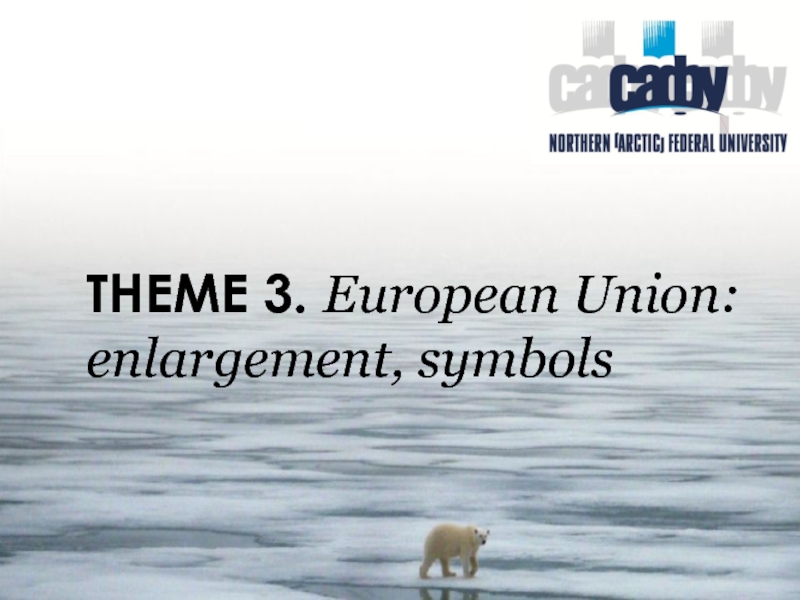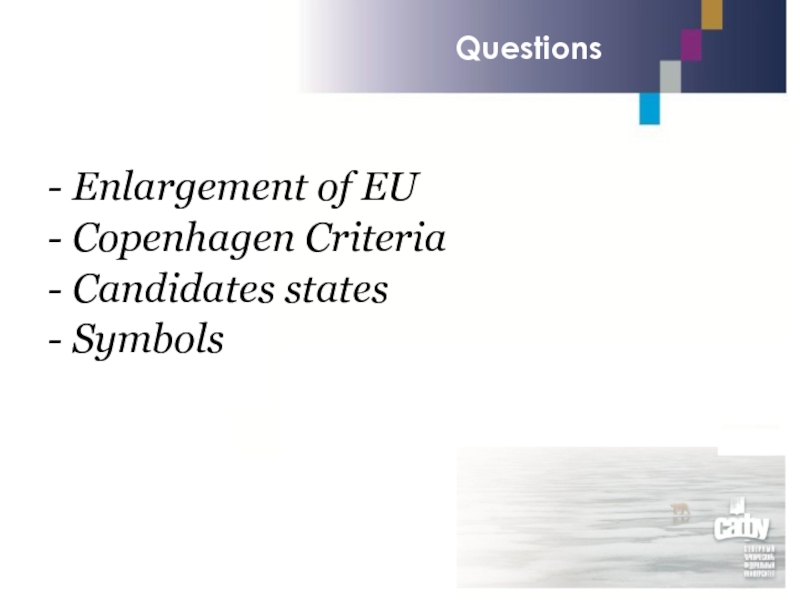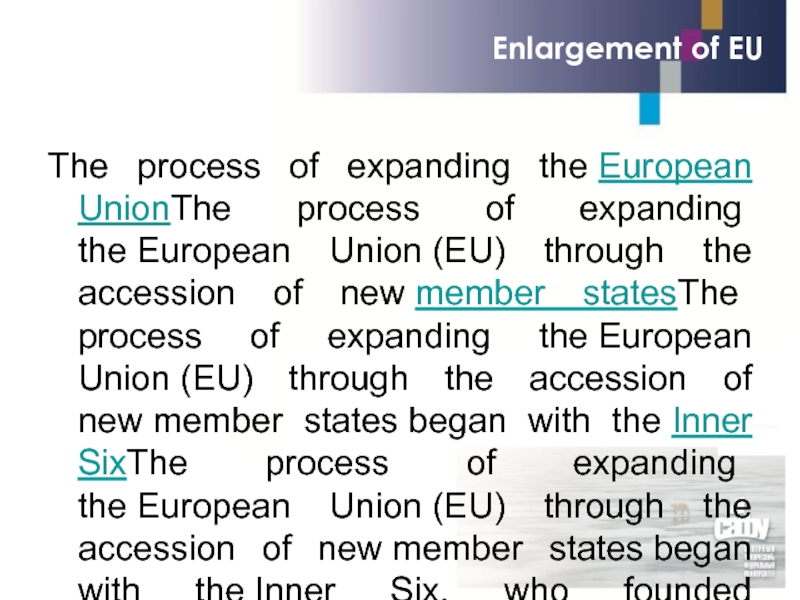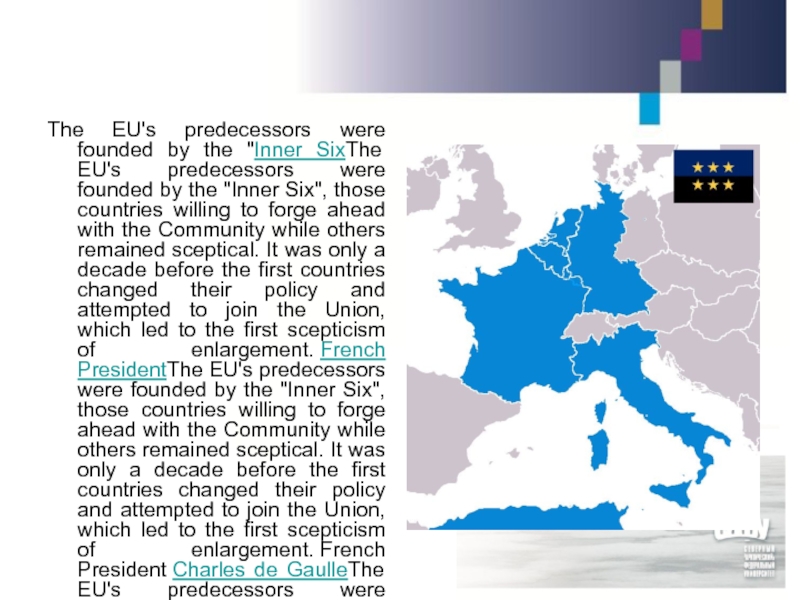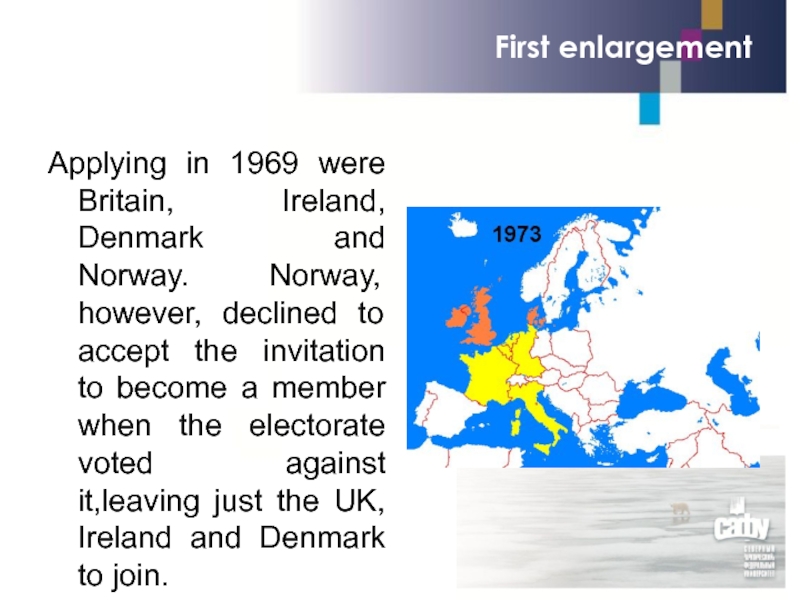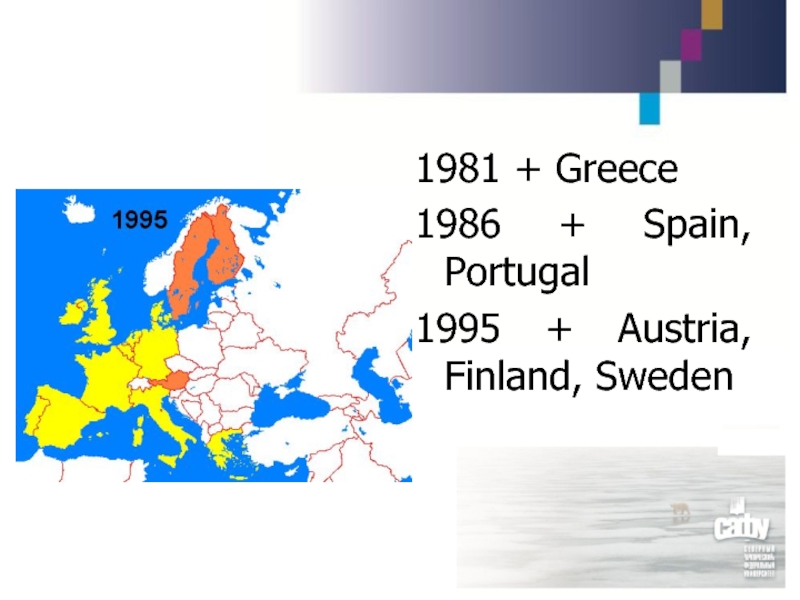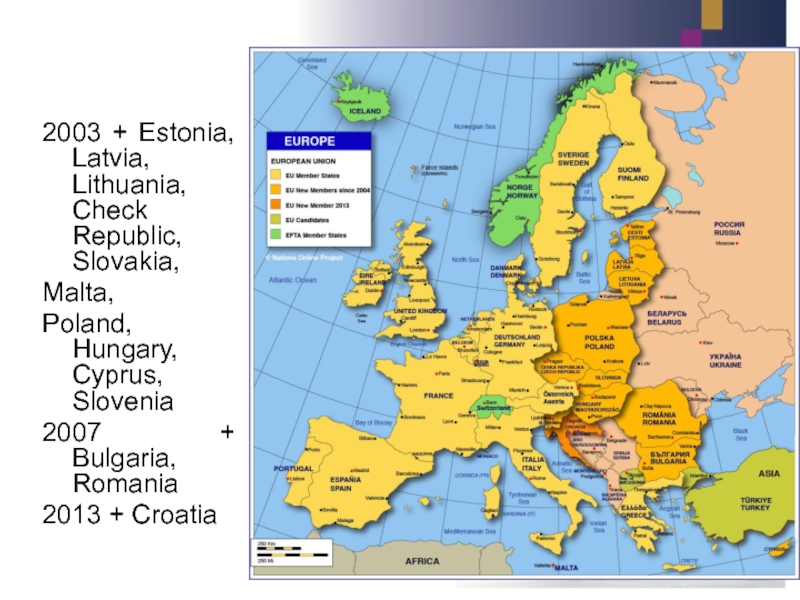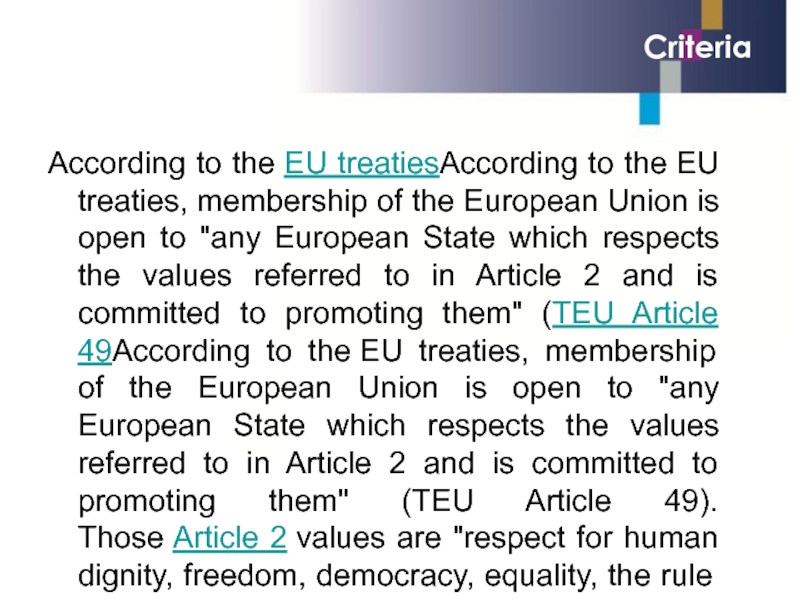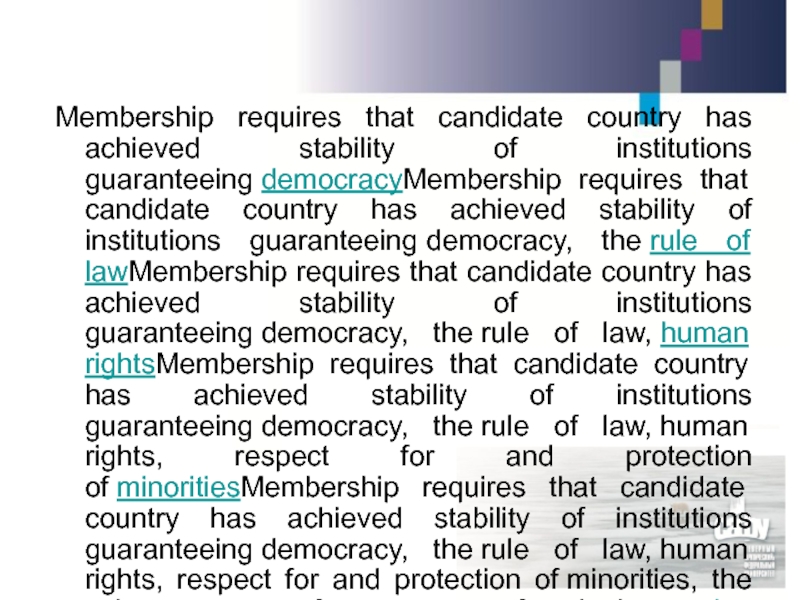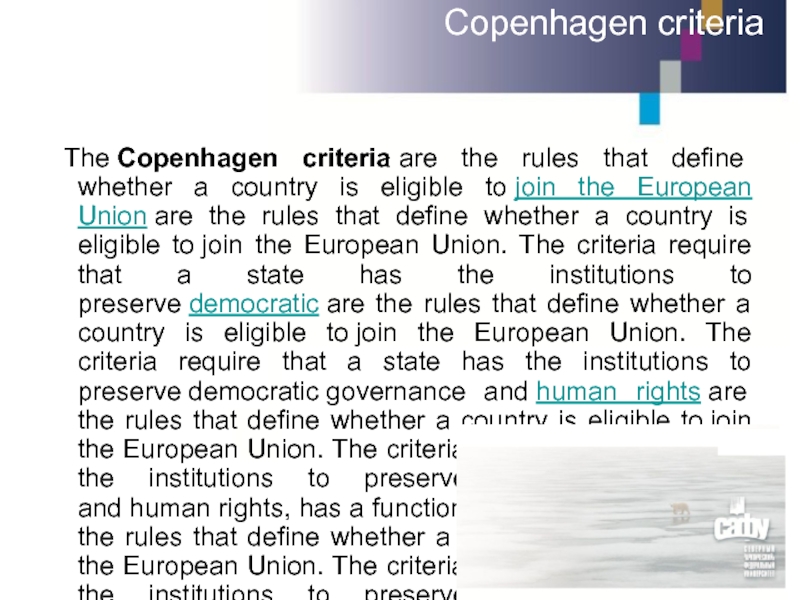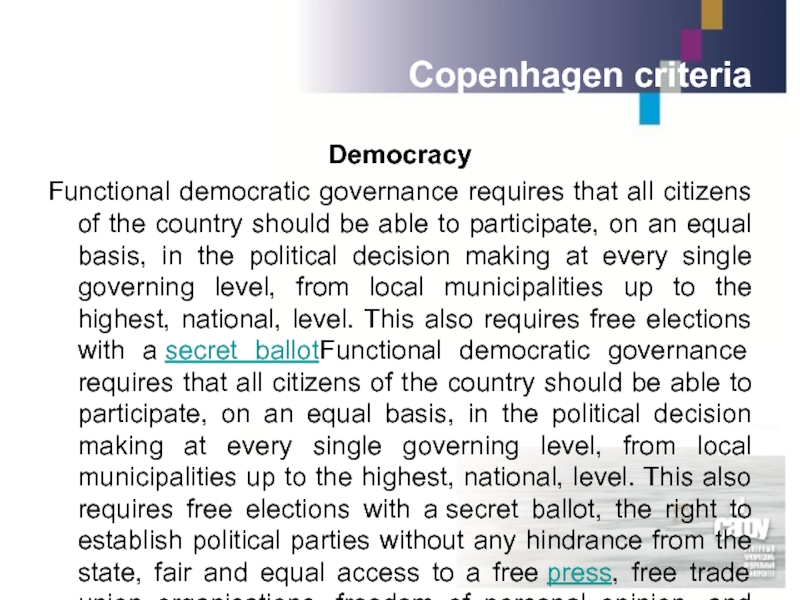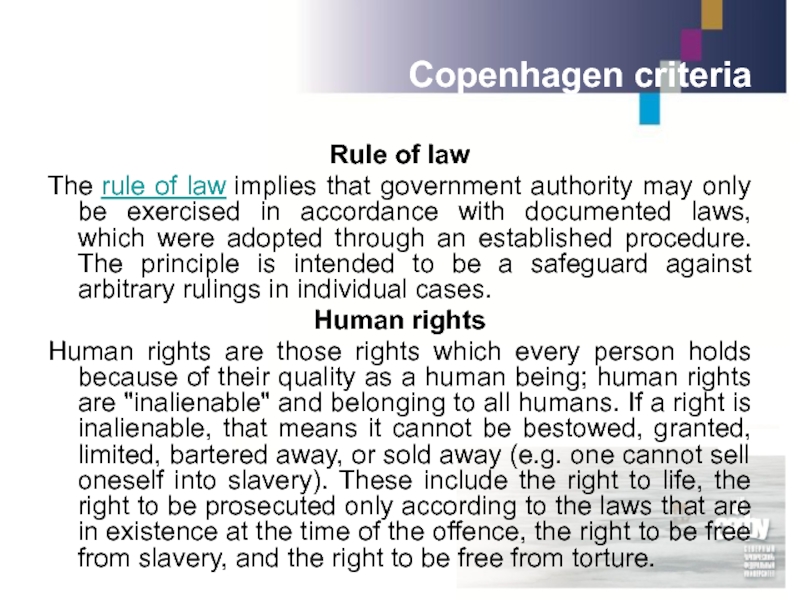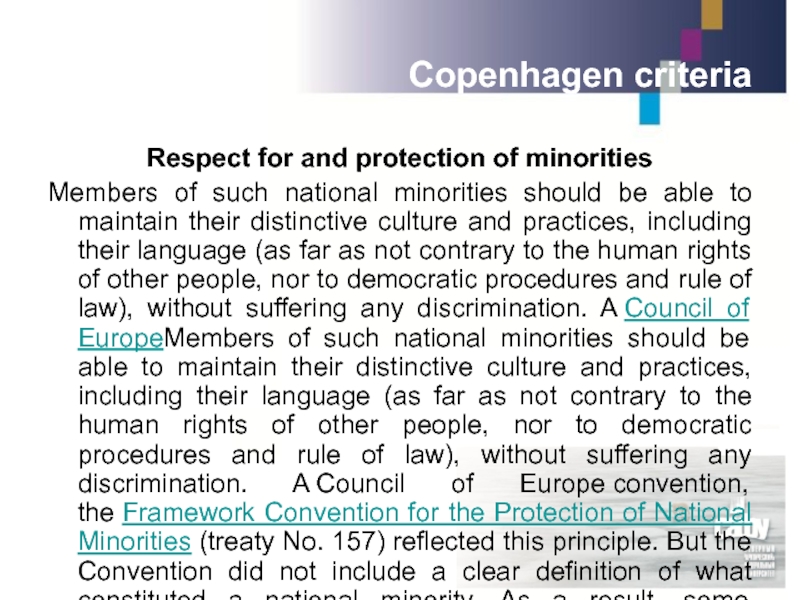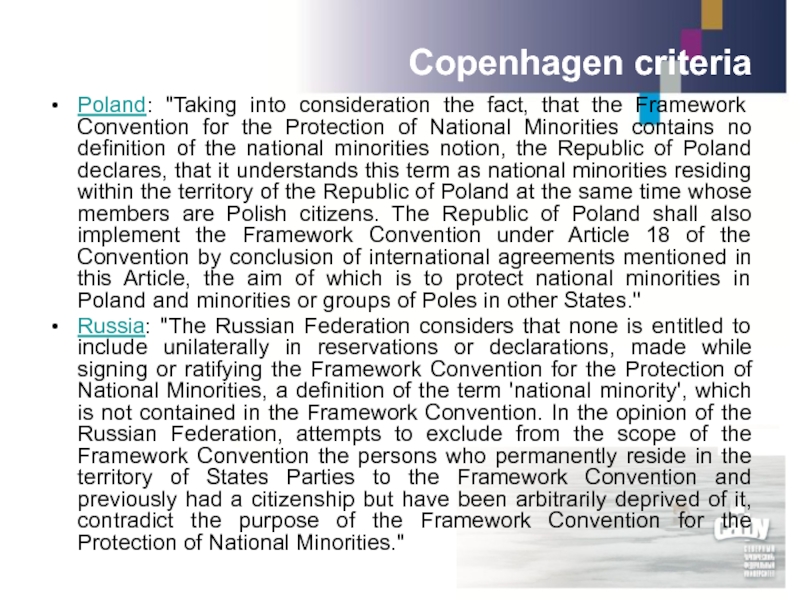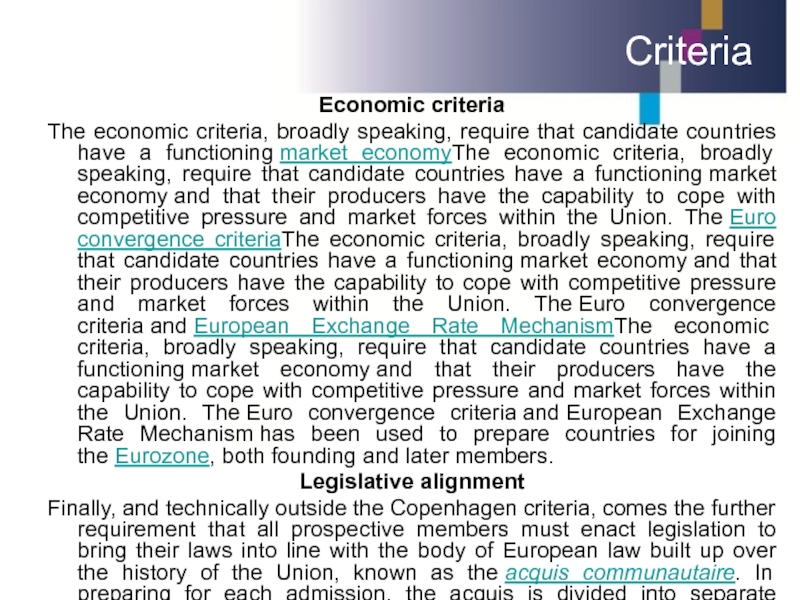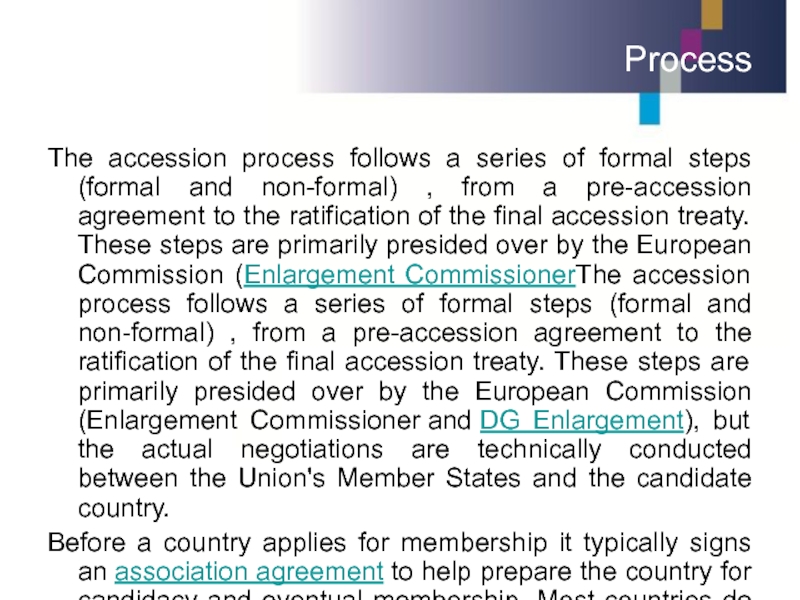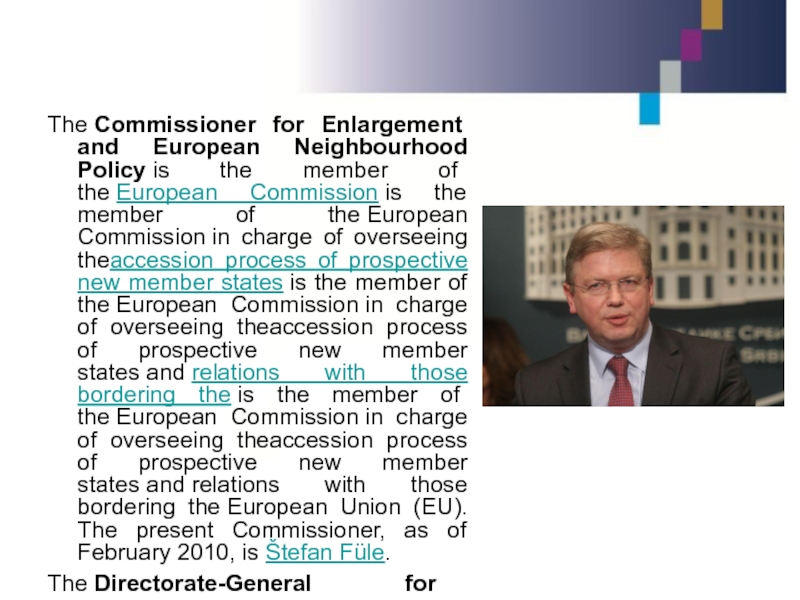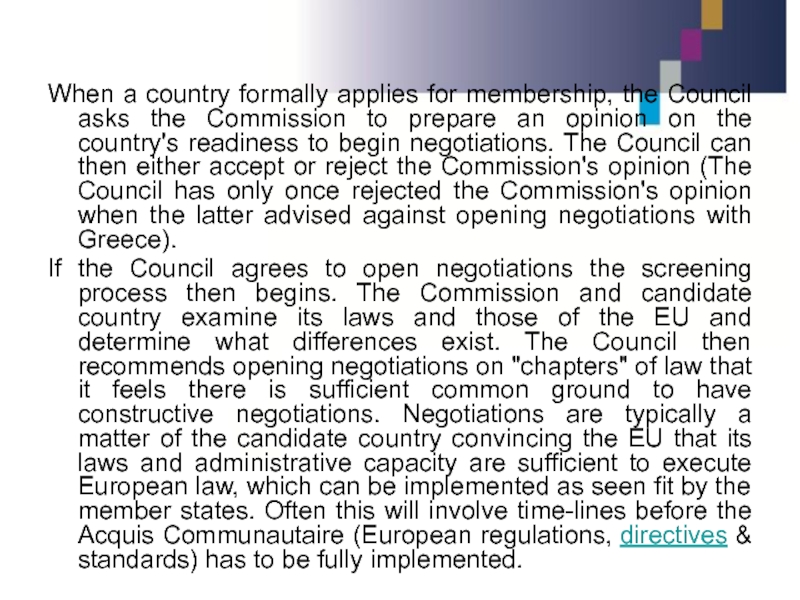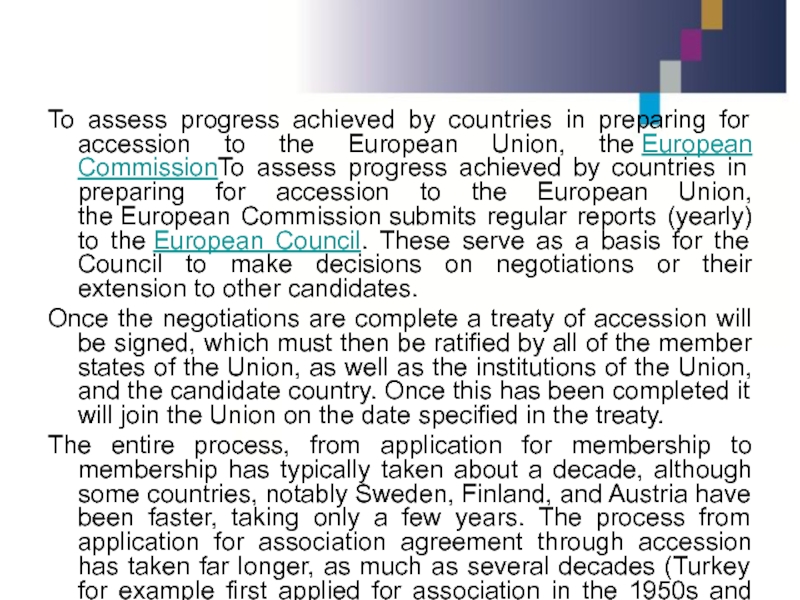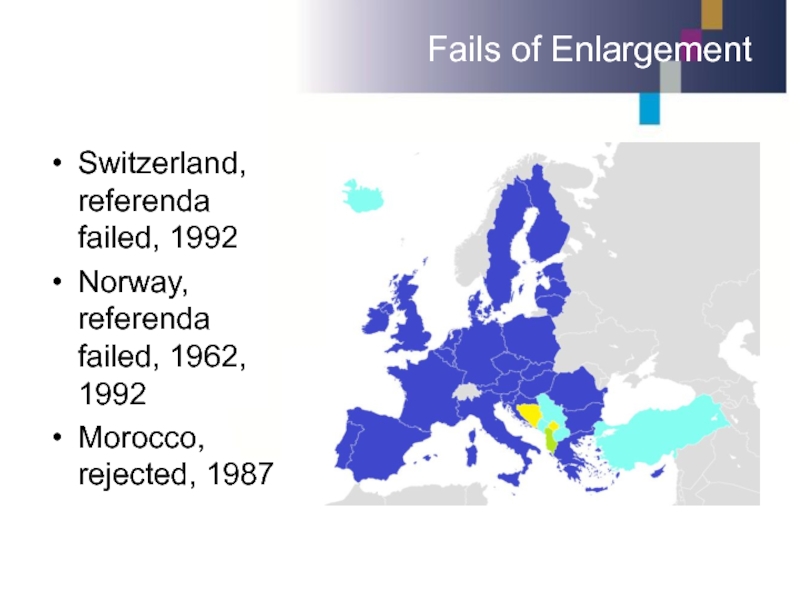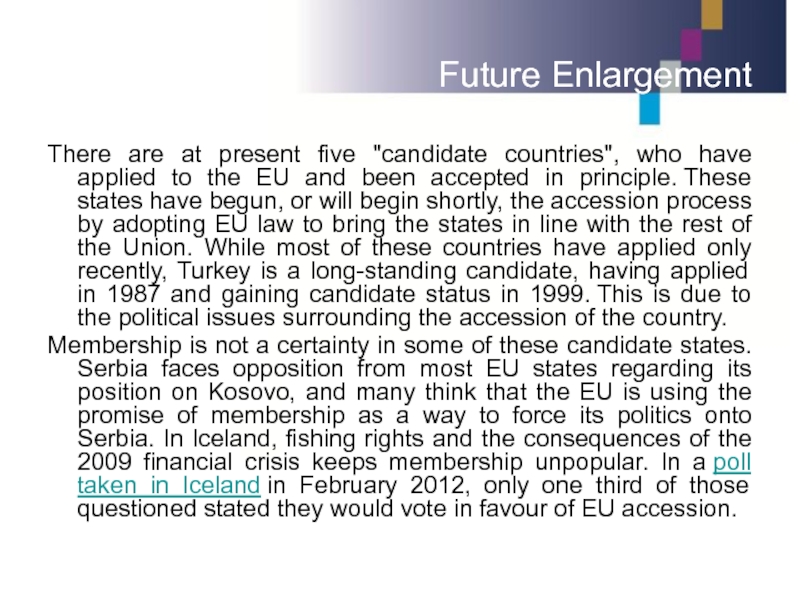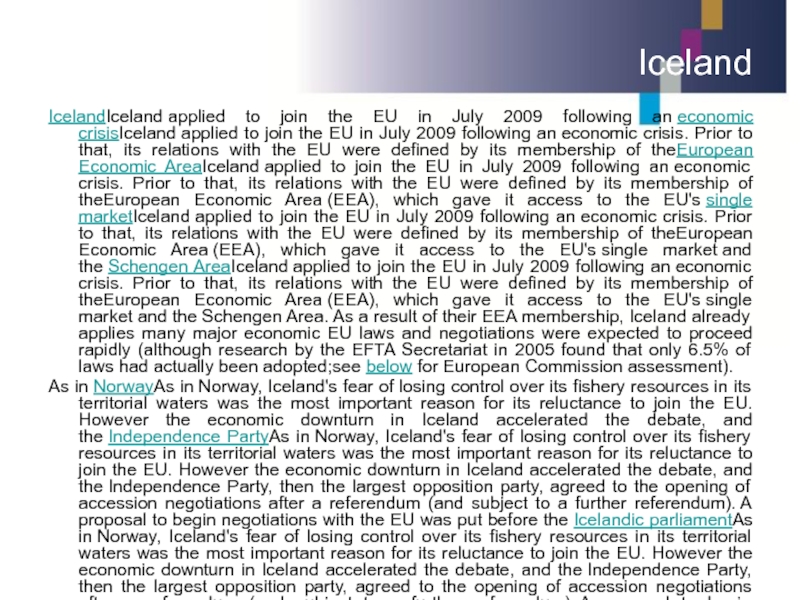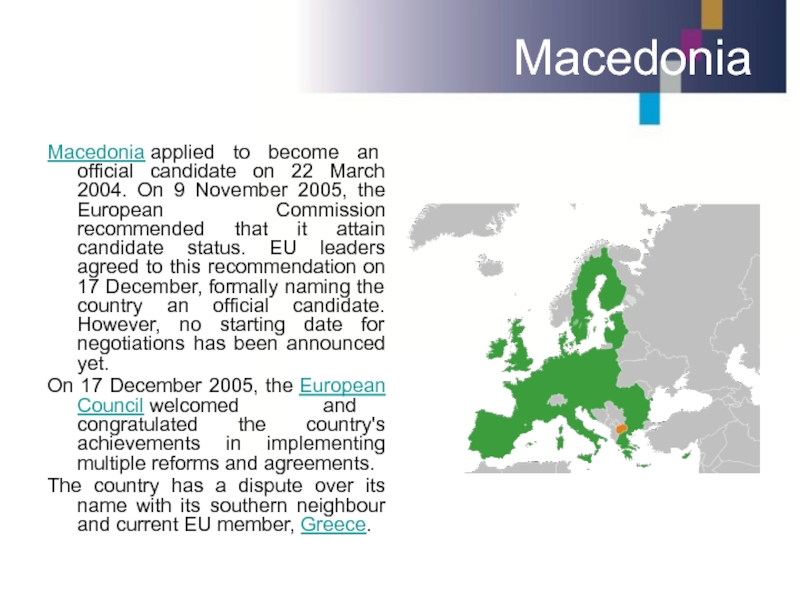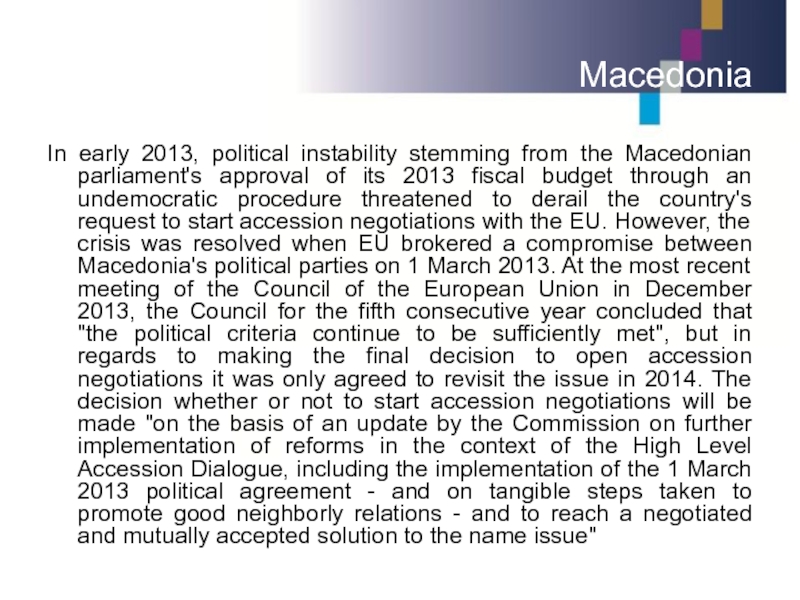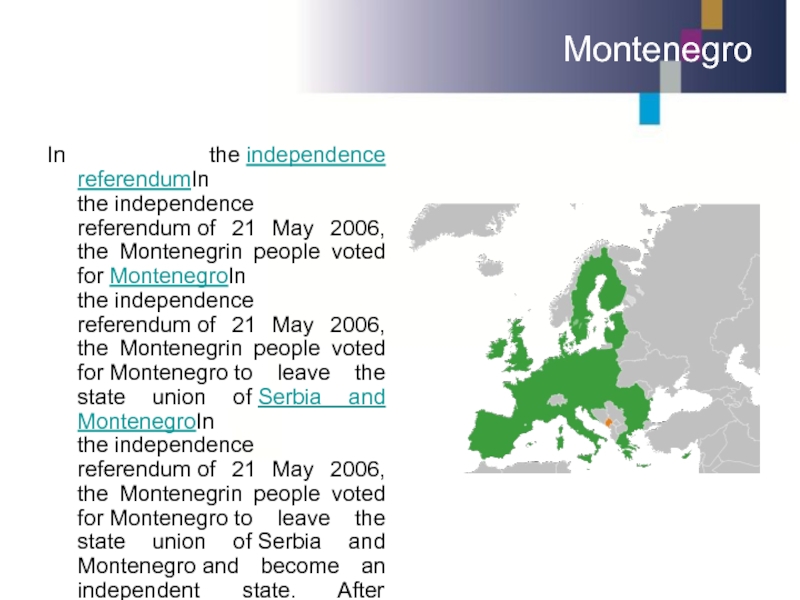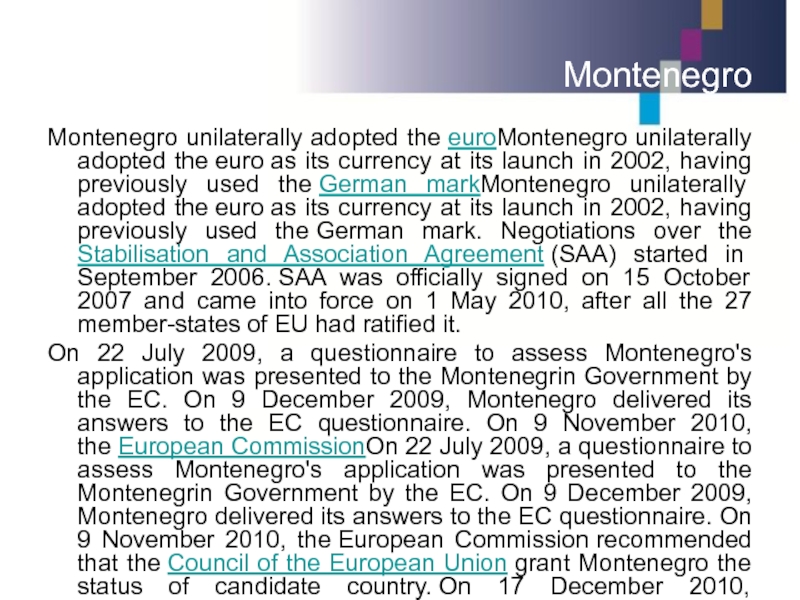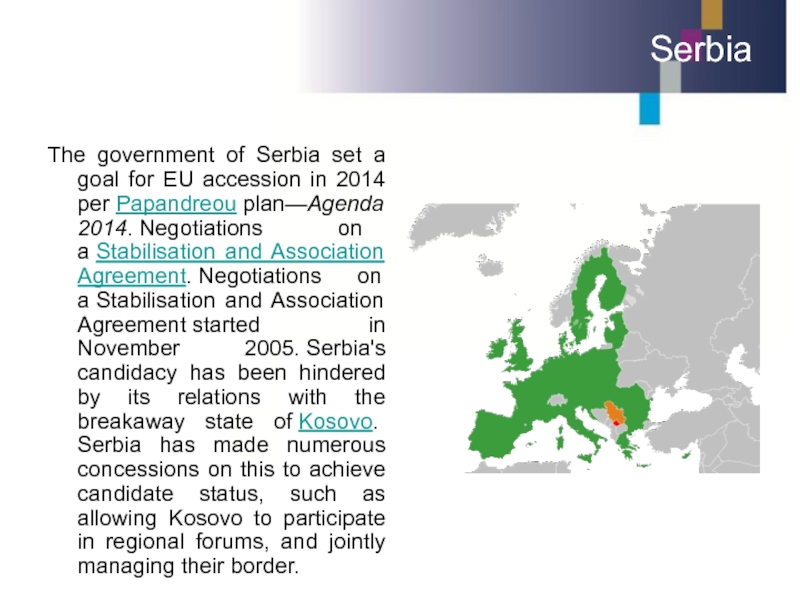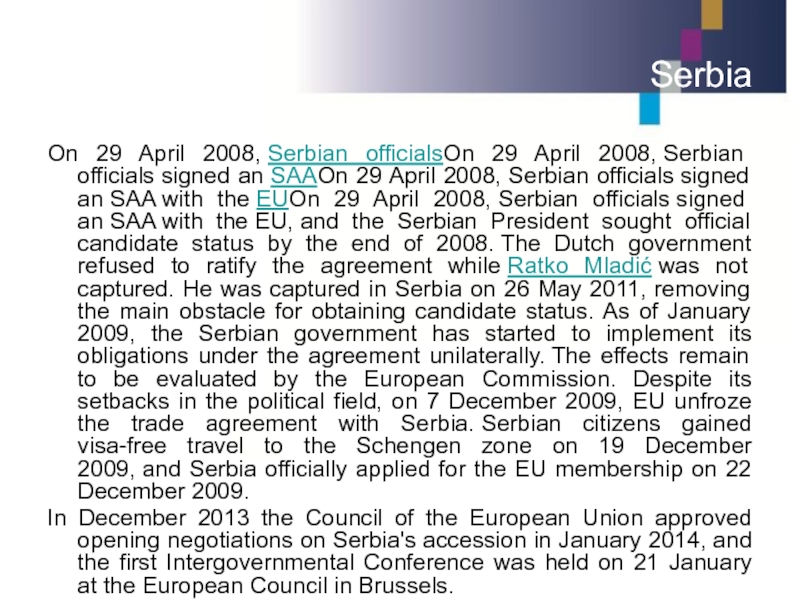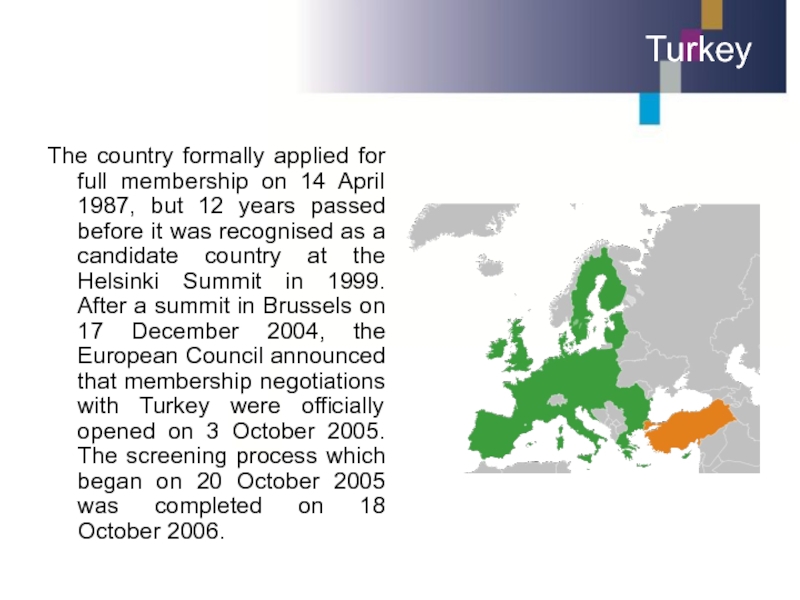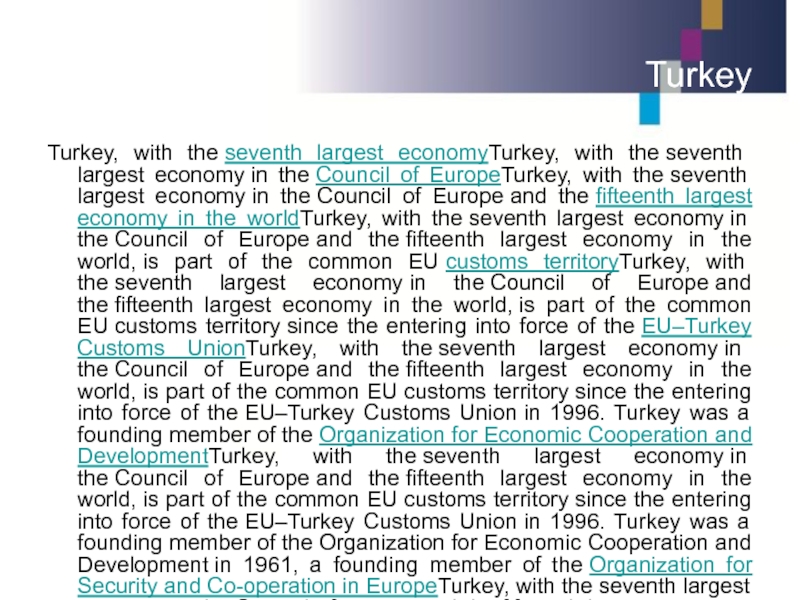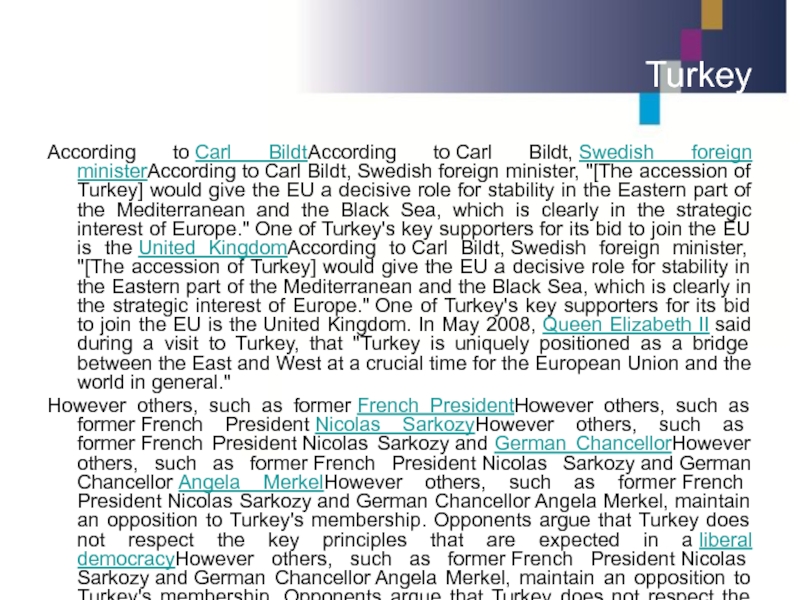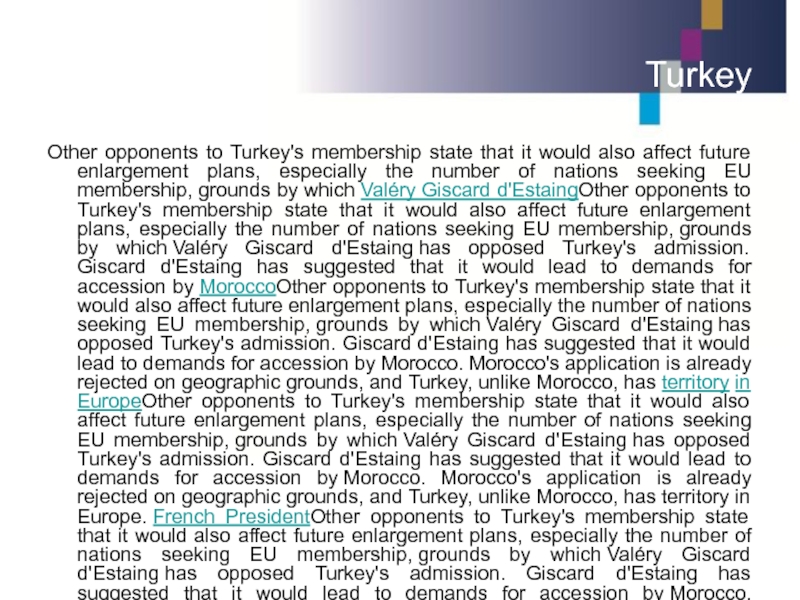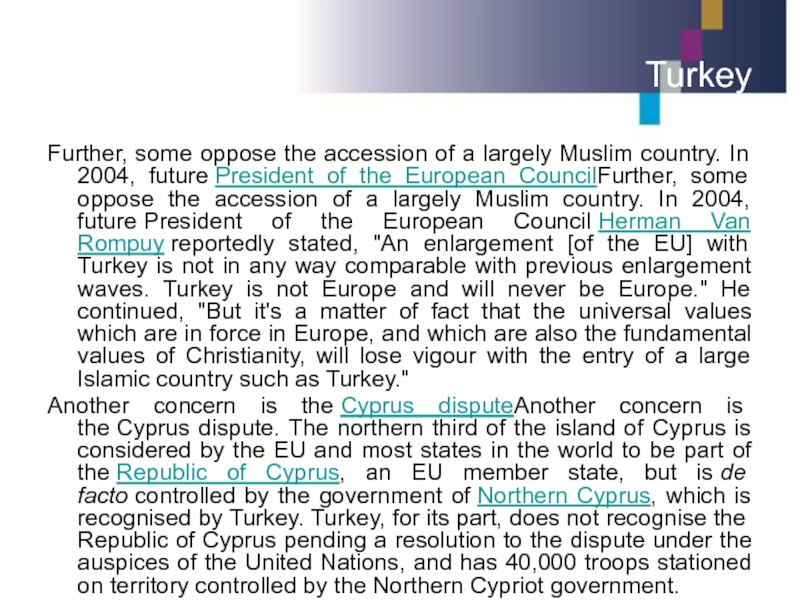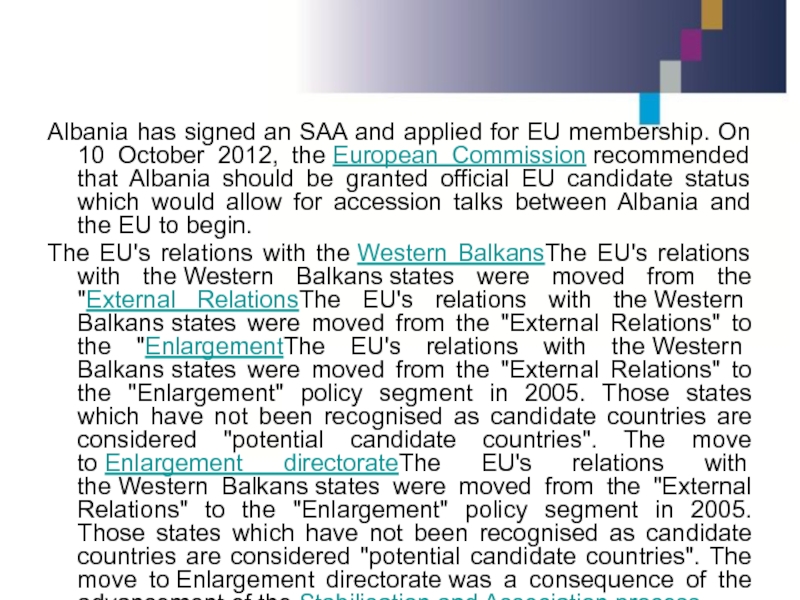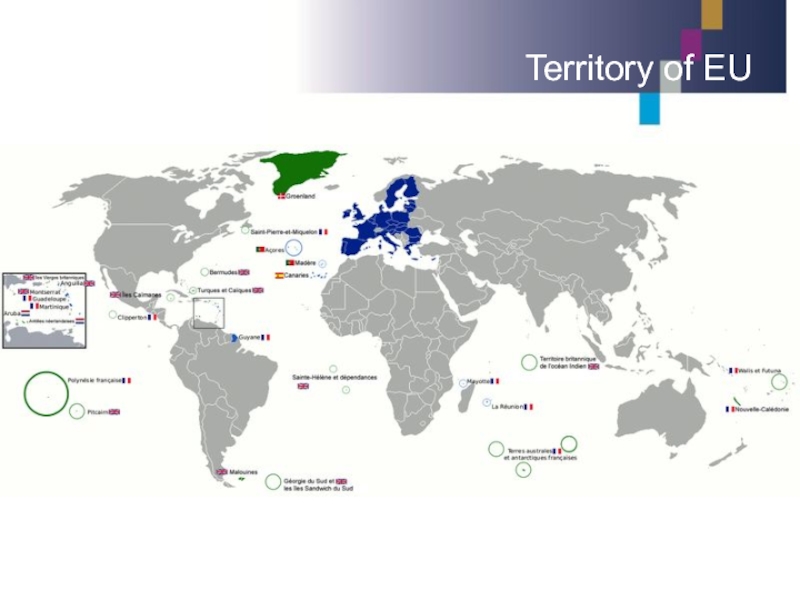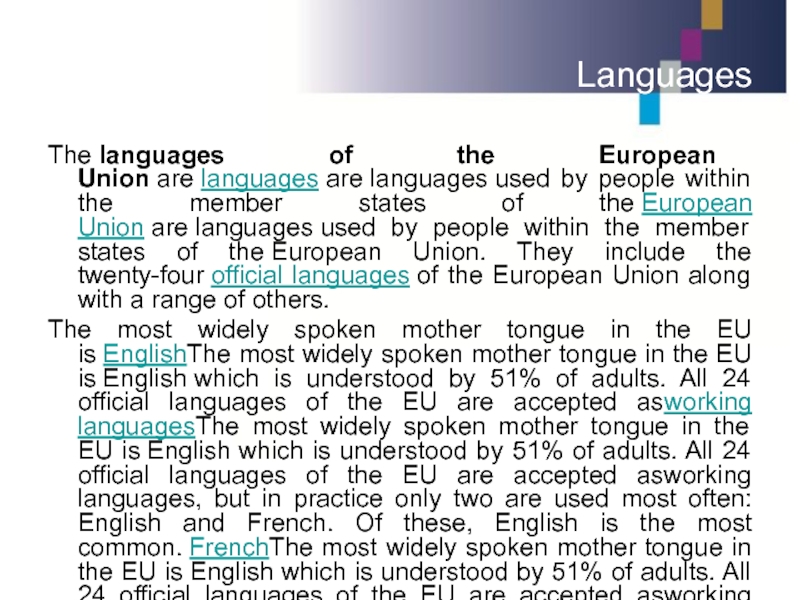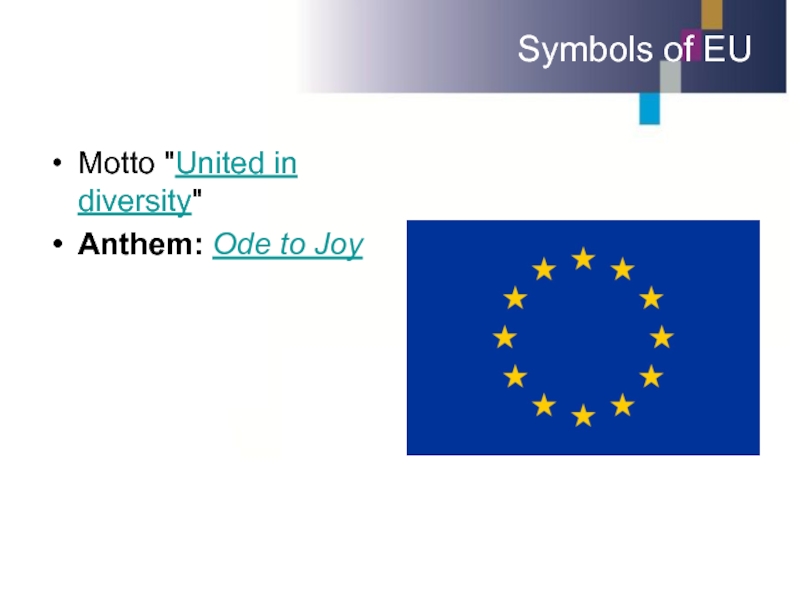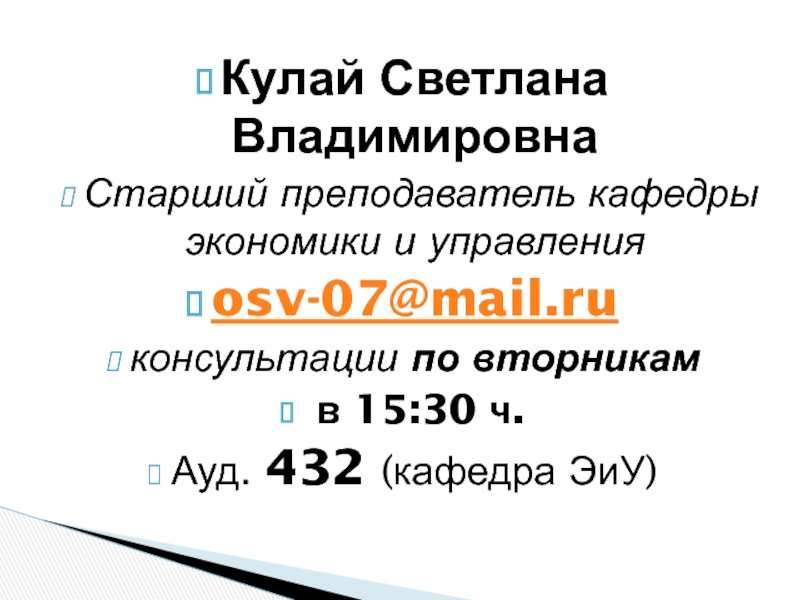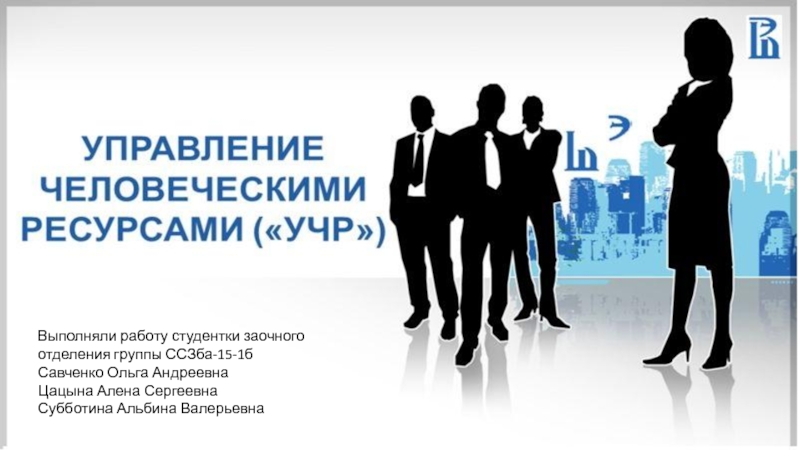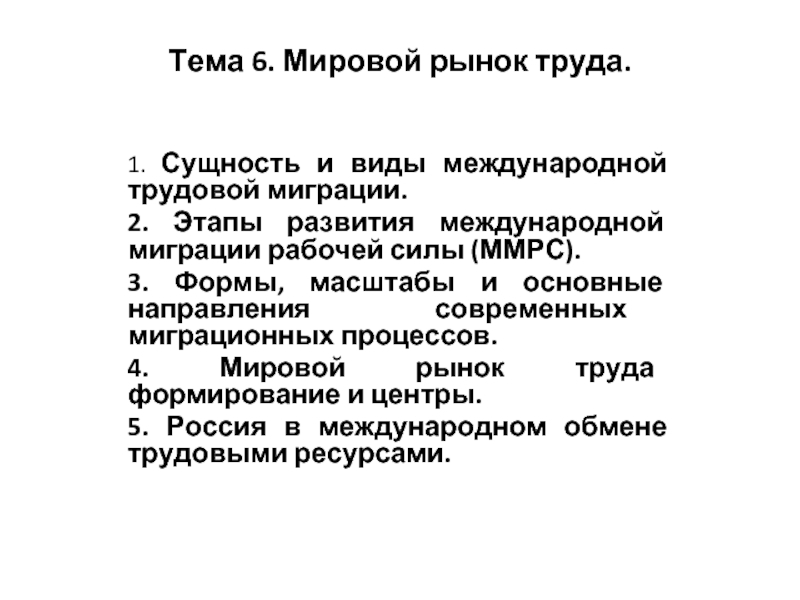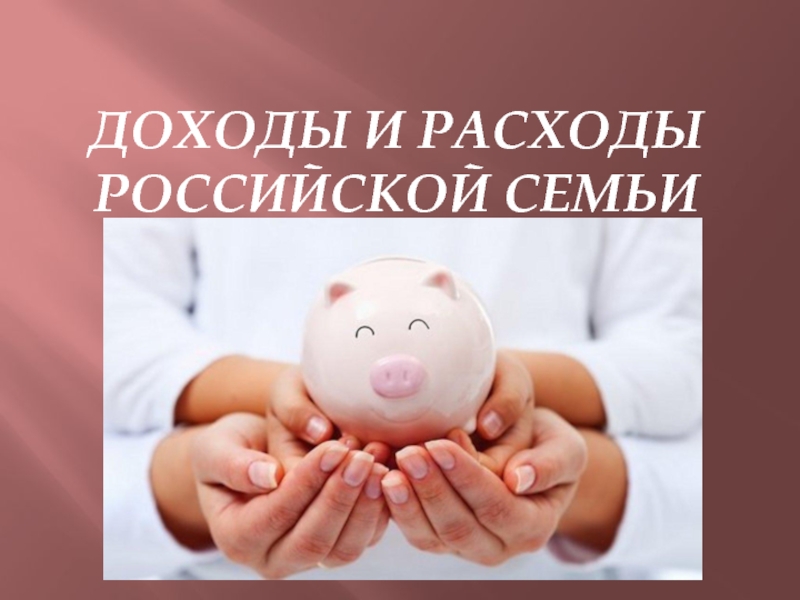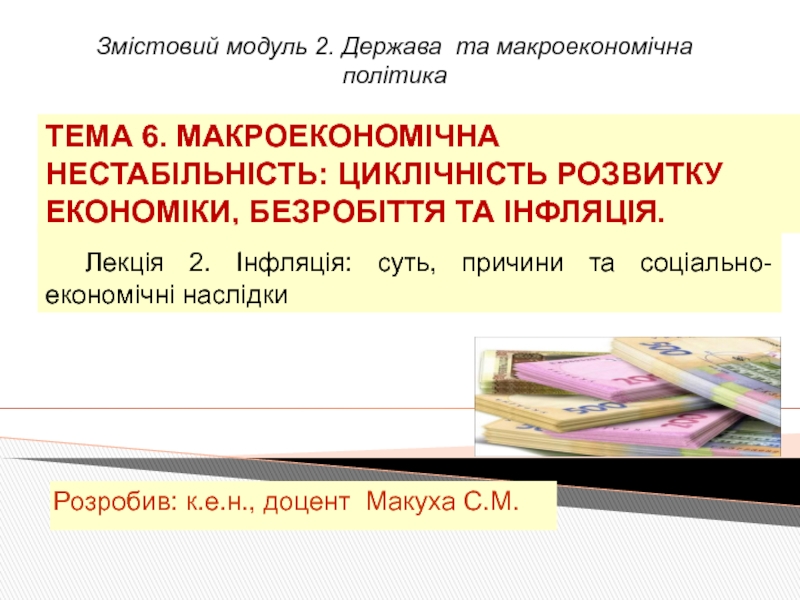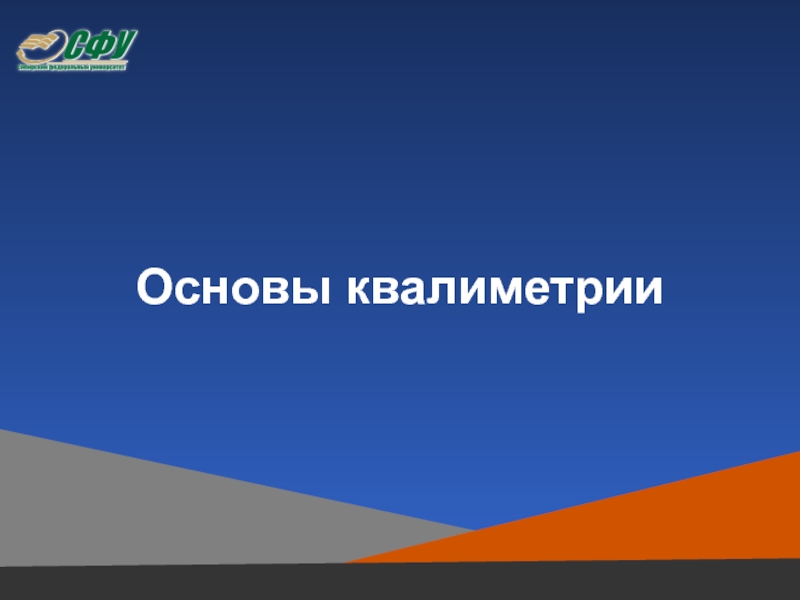- Главная
- Разное
- Дизайн
- Бизнес и предпринимательство
- Аналитика
- Образование
- Развлечения
- Красота и здоровье
- Финансы
- Государство
- Путешествия
- Спорт
- Недвижимость
- Армия
- Графика
- Культурология
- Еда и кулинария
- Лингвистика
- Английский язык
- Астрономия
- Алгебра
- Биология
- География
- Детские презентации
- Информатика
- История
- Литература
- Маркетинг
- Математика
- Медицина
- Менеджмент
- Музыка
- МХК
- Немецкий язык
- ОБЖ
- Обществознание
- Окружающий мир
- Педагогика
- Русский язык
- Технология
- Физика
- Философия
- Химия
- Шаблоны, картинки для презентаций
- Экология
- Экономика
- Юриспруденция
European Union: enlargement, symbols презентация
Содержание
- 1. European Union: enlargement, symbols
- 2. Questions Enlargement of EU Copenhagen Criteria Candidates states Symbols
- 3. The process of expanding the European UnionThe process
- 4. The EU's predecessors were founded by the
- 5. First enlargement Applying in 1969 were Britain,
- 6. 1981 + Greece 1986 + Spain, Portugal 1995 + Austria, Finland, Sweden
- 7. 2003 + Estonia, Latvia, Lithuania, Check Republic,
- 8. Criteria According to the EU treatiesAccording to the EU
- 9. Membership requires that candidate country has achieved
- 10. Copenhagen criteria The Copenhagen criteria are the
- 11. Copenhagen criteria Democracy Functional democratic governance requires
- 12. Copenhagen criteria Rule of law The rule of
- 13. Copenhagen criteria Respect for and protection of
- 14. Poland: "Taking into consideration the fact, that
- 15. Criteria Economic criteria The economic criteria, broadly
- 16. Process The accession process follows a series
- 17. The Commissioner for Enlargement and European Neighbourhood Policy is
- 18. When a country formally applies for membership,
- 19. To assess progress achieved by countries in
- 20. Fails of Enlargement Switzerland, referenda failed, 1992 Norway, referenda failed, 1962, 1992 Morocco, rejected, 1987
- 21. Future Enlargement There are at present five
- 22. Iceland IcelandIceland applied to join the EU in
- 23. Macedonia Macedonia applied to become an official candidate
- 24. Macedonia In early 2013, political instability stemming
- 25. Montenegro In the independence referendumIn the independence referendum of 21
- 26. Montenegro Montenegro unilaterally adopted the euroMontenegro unilaterally adopted
- 27. Serbia The government of Serbia set a
- 28. Serbia On 29 April 2008, Serbian officialsOn 29
- 29. Turkey The country formally applied for full
- 30. Turkey Turkey, with the seventh largest economyTurkey, with
- 31. Turkey According to Carl BildtAccording to Carl Bildt, Swedish foreign
- 32. Turkey Other opponents to Turkey's membership state
- 33. Turkey Further, some oppose the accession of
- 34. Albania has signed an SAA and applied
- 35. Territory of EU
- 36. Languages The languages of the European Union are languages are languages used by
- 37. Symbols of EU Motto "United in diversity" Anthem: Ode to Joy
Слайд 3The process of expanding the European UnionThe process of expanding the European Union (EU)
through the accession of new member statesThe process of expanding the European Union (EU) through the accession of new member states began with the Inner SixThe process of expanding the European Union (EU) through the accession of new member states began with the Inner Six, who founded the European Coal and Steel CommunityThe process of expanding the European Union (EU) through the accession of new member states began with the Inner Six, who founded the European Coal and Steel Community (the EU's predecessor) in 1952. Since then, the EU's membership has grown to twenty-eight, with the latest member state being Croatia, which joined in July 2013.
Enlargement of EU
Слайд 4The EU's predecessors were founded by the "Inner SixThe EU's predecessors
were founded by the "Inner Six", those countries willing to forge ahead with the Community while others remained sceptical. It was only a decade before the first countries changed their policy and attempted to join the Union, which led to the first scepticism of enlargement. French PresidentThe EU's predecessors were founded by the "Inner Six", those countries willing to forge ahead with the Community while others remained sceptical. It was only a decade before the first countries changed their policy and attempted to join the Union, which led to the first scepticism of enlargement. French President Charles de GaulleThe EU's predecessors were founded by the "Inner Six", those countries willing to forge ahead with the Community while others remained sceptical. It was only a decade before the first countries changed their policy and attempted to join the Union, which led to the first scepticism of enlargement. French President Charles de Gaulle feared British membership would be an American Trojan horseThe EU's predecessors were founded by the "Inner Six", those countries willing to forge ahead with the Community while others remained sceptical. It was only a decade before the first countries changed their policy and attempted to join the Union, which led to the first scepticism of enlargement. French President Charles de Gaulle feared British membership would be an American Trojan horse and vetoed its application. It was only after de Gaulle left office and a 12-hour talk by British Prime Minister Edward HeathThe EU's predecessors were founded by the "Inner Six", those countries willing to forge ahead with the Community while others remained sceptical. It was only a decade before the first countries changed their policy and attempted to join the Union, which led to the first scepticism of enlargement. French President Charles de Gaulle feared British membership would be an American Trojan horse and vetoed its application. It was only after de Gaulle left office and a 12-hour talk by British Prime Minister Edward Heath and French President Georges Pompidou took place that Britain's third application succeeded in 1970
Слайд 5First enlargement
Applying in 1969 were Britain, Ireland, Denmark and Norway. Norway,
however, declined to accept the invitation to become a member when the electorate voted against it,leaving just the UK, Ireland and Denmark to join.
Слайд 72003 + Estonia, Latvia, Lithuania, Check Republic, Slovakia,
Malta,
Poland, Hungary,
Cyprus, Slovenia
2007 + Bulgaria, Romania
2013 + Croatia
2007 + Bulgaria, Romania
2013 + Croatia
Слайд 8Criteria
According to the EU treatiesAccording to the EU treaties, membership of the European
Union is open to "any European State which respects the values referred to in Article 2 and is committed to promoting them" (TEU Article 49According to the EU treaties, membership of the European Union is open to "any European State which respects the values referred to in Article 2 and is committed to promoting them" (TEU Article 49). Those Article 2 values are "respect for human dignity, freedom, democracy, equality, the rule of law and respect for human rights, including the rights of persons belonging to minorities."
Слайд 9Membership requires that candidate country has achieved stability of institutions guaranteeing democracyMembership
requires that candidate country has achieved stability of institutions guaranteeing democracy, the rule of lawMembership requires that candidate country has achieved stability of institutions guaranteeing democracy, the rule of law, human rightsMembership requires that candidate country has achieved stability of institutions guaranteeing democracy, the rule of law, human rights, respect for and protection of minoritiesMembership requires that candidate country has achieved stability of institutions guaranteeing democracy, the rule of law, human rights, respect for and protection of minorities, the existence of a functioning market economyMembership requires that candidate country has achieved stability of institutions guaranteeing democracy, the rule of law, human rights, respect for and protection of minorities, the existence of a functioning market economy as well as the capacity to cope with competitive pressure and market forces within the Union. Membership presupposes the candidate's ability to take on the obligations of membership including adherence to the aims of political, economic and monetary union.
—Excerpt from the Copenhagen Presidency conclusions
—Excerpt from the Copenhagen Presidency conclusions
Слайд 10Copenhagen criteria
The Copenhagen criteria are the rules that define whether a country
is eligible to join the European Union are the rules that define whether a country is eligible to join the European Union. The criteria require that a state has the institutions to preserve democratic are the rules that define whether a country is eligible to join the European Union. The criteria require that a state has the institutions to preserve democratic governance and human rights are the rules that define whether a country is eligible to join the European Union. The criteria require that a state has the institutions to preserve democratic governance and human rights, has a functioning market economy are the rules that define whether a country is eligible to join the European Union. The criteria require that a state has the institutions to preserve democratic governance and human rights, has a functioning market economy, and accepts the obligations and intent of the EU.
These membership criteria were laid down at the June 1993 European CouncilThese membership criteria were laid down at the June 1993 European Council in Copenhagen, Denmark, from which they take their name. Except from the Copenhagen Presidency conclusions
These membership criteria were laid down at the June 1993 European CouncilThese membership criteria were laid down at the June 1993 European Council in Copenhagen, Denmark, from which they take their name. Except from the Copenhagen Presidency conclusions
Слайд 11Copenhagen criteria
Democracy
Functional democratic governance requires that all citizens of the country
should be able to participate, on an equal basis, in the political decision making at every single governing level, from local municipalities up to the highest, national, level. This also requires free elections with a secret ballotFunctional democratic governance requires that all citizens of the country should be able to participate, on an equal basis, in the political decision making at every single governing level, from local municipalities up to the highest, national, level. This also requires free elections with a secret ballot, the right to establish political parties without any hindrance from the state, fair and equal access to a free press, free trade union organisations, freedom of personal opinion, and executive powers restricted by laws and allowing free access to judges independent of the executive.
Слайд 12Copenhagen criteria
Rule of law
The rule of law implies that government authority may only
be exercised in accordance with documented laws, which were adopted through an established procedure. The principle is intended to be a safeguard against arbitrary rulings in individual cases.
Human rights
Human rights are those rights which every person holds because of their quality as a human being; human rights are "inalienable" and belonging to all humans. If a right is inalienable, that means it cannot be bestowed, granted, limited, bartered away, or sold away (e.g. one cannot sell oneself into slavery). These include the right to life, the right to be prosecuted only according to the laws that are in existence at the time of the offence, the right to be free from slavery, and the right to be free from torture.
Human rights
Human rights are those rights which every person holds because of their quality as a human being; human rights are "inalienable" and belonging to all humans. If a right is inalienable, that means it cannot be bestowed, granted, limited, bartered away, or sold away (e.g. one cannot sell oneself into slavery). These include the right to life, the right to be prosecuted only according to the laws that are in existence at the time of the offence, the right to be free from slavery, and the right to be free from torture.
Слайд 13Copenhagen criteria
Respect for and protection of minorities
Members of such national minorities
should be able to maintain their distinctive culture and practices, including their language (as far as not contrary to the human rights of other people, nor to democratic procedures and rule of law), without suffering any discrimination. A Council of EuropeMembers of such national minorities should be able to maintain their distinctive culture and practices, including their language (as far as not contrary to the human rights of other people, nor to democratic procedures and rule of law), without suffering any discrimination. A Council of Europe convention, the Framework Convention for the Protection of National Minorities (treaty No. 157) reflected this principle. But the Convention did not include a clear definition of what constituted a national minority. As a result, some signatory states added official declarations on the matter.
Слайд 14Poland: "Taking into consideration the fact, that the Framework Convention for
the Protection of National Minorities contains no definition of the national minorities notion, the Republic of Poland declares, that it understands this term as national minorities residing within the territory of the Republic of Poland at the same time whose members are Polish citizens. The Republic of Poland shall also implement the Framework Convention under Article 18 of the Convention by conclusion of international agreements mentioned in this Article, the aim of which is to protect national minorities in Poland and minorities or groups of Poles in other States."
Russia: "The Russian Federation considers that none is entitled to include unilaterally in reservations or declarations, made while signing or ratifying the Framework Convention for the Protection of National Minorities, a definition of the term 'national minority', which is not contained in the Framework Convention. In the opinion of the Russian Federation, attempts to exclude from the scope of the Framework Convention the persons who permanently reside in the territory of States Parties to the Framework Convention and previously had a citizenship but have been arbitrarily deprived of it, contradict the purpose of the Framework Convention for the Protection of National Minorities."
Russia: "The Russian Federation considers that none is entitled to include unilaterally in reservations or declarations, made while signing or ratifying the Framework Convention for the Protection of National Minorities, a definition of the term 'national minority', which is not contained in the Framework Convention. In the opinion of the Russian Federation, attempts to exclude from the scope of the Framework Convention the persons who permanently reside in the territory of States Parties to the Framework Convention and previously had a citizenship but have been arbitrarily deprived of it, contradict the purpose of the Framework Convention for the Protection of National Minorities."
Copenhagen criteria
Слайд 15Criteria
Economic criteria
The economic criteria, broadly speaking, require that candidate countries have
a functioning market economyThe economic criteria, broadly speaking, require that candidate countries have a functioning market economy and that their producers have the capability to cope with competitive pressure and market forces within the Union. The Euro convergence criteriaThe economic criteria, broadly speaking, require that candidate countries have a functioning market economy and that their producers have the capability to cope with competitive pressure and market forces within the Union. The Euro convergence criteria and European Exchange Rate MechanismThe economic criteria, broadly speaking, require that candidate countries have a functioning market economy and that their producers have the capability to cope with competitive pressure and market forces within the Union. The Euro convergence criteria and European Exchange Rate Mechanism has been used to prepare countries for joining the Eurozone, both founding and later members.
Legislative alignment
Finally, and technically outside the Copenhagen criteria, comes the further requirement that all prospective members must enact legislation to bring their laws into line with the body of European law built up over the history of the Union, known as the acquis communautaire. In preparing for each admission, the acquis is divided into separate chapters, each dealing with different policy areas. For the process of the fifth enlargement. In preparing for each admission, the acquis is divided into separate chapters, each dealing with different policy areas. For the process of the fifth enlargement that concluded with the admission of Bulgaria and Romania in 2007. In preparing for each admission, the acquis is divided into separate chapters, each dealing with different policy areas. For the process of the fifth enlargement that concluded with the admission of Bulgaria and Romania in 2007, there were 31 chapters. For the talks with Croatia. In preparing for each admission, the acquis is divided into separate chapters, each dealing with different policy areas. For the process of the fifth enlargement that concluded with the admission of Bulgaria and Romania in 2007, there were 31 chapters. For the talks with Croatia, Turkey. In preparing for each admission, the acquis is divided into separate chapters, each dealing with different policy areas. For the process of the fifth enlargement that concluded with the admission of Bulgaria and Romania in 2007, there were 31 chapters. For the talks with Croatia, Turkey and Iceland the acquis has been split further into 35 chapters.
Legislative alignment
Finally, and technically outside the Copenhagen criteria, comes the further requirement that all prospective members must enact legislation to bring their laws into line with the body of European law built up over the history of the Union, known as the acquis communautaire. In preparing for each admission, the acquis is divided into separate chapters, each dealing with different policy areas. For the process of the fifth enlargement. In preparing for each admission, the acquis is divided into separate chapters, each dealing with different policy areas. For the process of the fifth enlargement that concluded with the admission of Bulgaria and Romania in 2007. In preparing for each admission, the acquis is divided into separate chapters, each dealing with different policy areas. For the process of the fifth enlargement that concluded with the admission of Bulgaria and Romania in 2007, there were 31 chapters. For the talks with Croatia. In preparing for each admission, the acquis is divided into separate chapters, each dealing with different policy areas. For the process of the fifth enlargement that concluded with the admission of Bulgaria and Romania in 2007, there were 31 chapters. For the talks with Croatia, Turkey. In preparing for each admission, the acquis is divided into separate chapters, each dealing with different policy areas. For the process of the fifth enlargement that concluded with the admission of Bulgaria and Romania in 2007, there were 31 chapters. For the talks with Croatia, Turkey and Iceland the acquis has been split further into 35 chapters.
Слайд 16Process
The accession process follows a series of formal steps (formal and
non-formal) , from a pre-accession agreement to the ratification of the final accession treaty. These steps are primarily presided over by the European Commission (Enlargement CommissionerThe accession process follows a series of formal steps (formal and non-formal) , from a pre-accession agreement to the ratification of the final accession treaty. These steps are primarily presided over by the European Commission (Enlargement Commissioner and DG Enlargement), but the actual negotiations are technically conducted between the Union's Member States and the candidate country.
Before a country applies for membership it typically signs an association agreement to help prepare the country for candidacy and eventual membership. Most countries do not meet the criteria to even begin negotiations before they apply, so they need many years to prepare for the process. An association agreement helps prepare for this first step.
Before a country applies for membership it typically signs an association agreement to help prepare the country for candidacy and eventual membership. Most countries do not meet the criteria to even begin negotiations before they apply, so they need many years to prepare for the process. An association agreement helps prepare for this first step.
Слайд 17The Commissioner for Enlargement and European Neighbourhood Policy is the member of the European
Commission is the member of the European Commission in charge of overseeing theaccession process of prospective new member states is the member of the European Commission in charge of overseeing theaccession process of prospective new member states and relations with those bordering the is the member of the European Commission in charge of overseeing theaccession process of prospective new member states and relations with those bordering the European Union (EU). The present Commissioner, as of February 2010, is Štefan Füle.
The Directorate-General for Enlargement is a Directorate-General is a Directorate-General of the European Commission. The DG Enlargement is responsible for the enlargement process of the European Union.
The current Director-General for Enlargement is Stefano Sannino
The Directorate-General for Enlargement is a Directorate-General is a Directorate-General of the European Commission. The DG Enlargement is responsible for the enlargement process of the European Union.
The current Director-General for Enlargement is Stefano Sannino
Слайд 18When a country formally applies for membership, the Council asks the
Commission to prepare an opinion on the country's readiness to begin negotiations. The Council can then either accept or reject the Commission's opinion (The Council has only once rejected the Commission's opinion when the latter advised against opening negotiations with Greece).
If the Council agrees to open negotiations the screening process then begins. The Commission and candidate country examine its laws and those of the EU and determine what differences exist. The Council then recommends opening negotiations on "chapters" of law that it feels there is sufficient common ground to have constructive negotiations. Negotiations are typically a matter of the candidate country convincing the EU that its laws and administrative capacity are sufficient to execute European law, which can be implemented as seen fit by the member states. Often this will involve time-lines before the Acquis Communautaire (European regulations, directives & standards) has to be fully implemented.
If the Council agrees to open negotiations the screening process then begins. The Commission and candidate country examine its laws and those of the EU and determine what differences exist. The Council then recommends opening negotiations on "chapters" of law that it feels there is sufficient common ground to have constructive negotiations. Negotiations are typically a matter of the candidate country convincing the EU that its laws and administrative capacity are sufficient to execute European law, which can be implemented as seen fit by the member states. Often this will involve time-lines before the Acquis Communautaire (European regulations, directives & standards) has to be fully implemented.
Слайд 19To assess progress achieved by countries in preparing for accession to
the European Union, the European CommissionTo assess progress achieved by countries in preparing for accession to the European Union, the European Commission submits regular reports (yearly) to the European Council. These serve as a basis for the Council to make decisions on negotiations or their extension to other candidates.
Once the negotiations are complete a treaty of accession will be signed, which must then be ratified by all of the member states of the Union, as well as the institutions of the Union, and the candidate country. Once this has been completed it will join the Union on the date specified in the treaty.
The entire process, from application for membership to membership has typically taken about a decade, although some countries, notably Sweden, Finland, and Austria have been faster, taking only a few years. The process from application for association agreement through accession has taken far longer, as much as several decades (Turkey for example first applied for association in the 1950s and has yet to conclude accession negotiations).
Once the negotiations are complete a treaty of accession will be signed, which must then be ratified by all of the member states of the Union, as well as the institutions of the Union, and the candidate country. Once this has been completed it will join the Union on the date specified in the treaty.
The entire process, from application for membership to membership has typically taken about a decade, although some countries, notably Sweden, Finland, and Austria have been faster, taking only a few years. The process from application for association agreement through accession has taken far longer, as much as several decades (Turkey for example first applied for association in the 1950s and has yet to conclude accession negotiations).
Слайд 20Fails of Enlargement
Switzerland, referenda failed, 1992
Norway, referenda failed, 1962, 1992
Morocco, rejected,
1987
Слайд 21Future Enlargement
There are at present five "candidate countries", who have applied
to the EU and been accepted in principle. These states have begun, or will begin shortly, the accession process by adopting EU law to bring the states in line with the rest of the Union. While most of these countries have applied only recently, Turkey is a long-standing candidate, having applied in 1987 and gaining candidate status in 1999. This is due to the political issues surrounding the accession of the country.
Membership is not a certainty in some of these candidate states. Serbia faces opposition from most EU states regarding its position on Kosovo, and many think that the EU is using the promise of membership as a way to force its politics onto Serbia. In Iceland, fishing rights and the consequences of the 2009 financial crisis keeps membership unpopular. In a poll taken in Iceland in February 2012, only one third of those questioned stated they would vote in favour of EU accession.
Membership is not a certainty in some of these candidate states. Serbia faces opposition from most EU states regarding its position on Kosovo, and many think that the EU is using the promise of membership as a way to force its politics onto Serbia. In Iceland, fishing rights and the consequences of the 2009 financial crisis keeps membership unpopular. In a poll taken in Iceland in February 2012, only one third of those questioned stated they would vote in favour of EU accession.
Слайд 22Iceland
IcelandIceland applied to join the EU in July 2009 following an economic crisisIceland applied
to join the EU in July 2009 following an economic crisis. Prior to that, its relations with the EU were defined by its membership of theEuropean Economic AreaIceland applied to join the EU in July 2009 following an economic crisis. Prior to that, its relations with the EU were defined by its membership of theEuropean Economic Area (EEA), which gave it access to the EU's single marketIceland applied to join the EU in July 2009 following an economic crisis. Prior to that, its relations with the EU were defined by its membership of theEuropean Economic Area (EEA), which gave it access to the EU's single market and the Schengen AreaIceland applied to join the EU in July 2009 following an economic crisis. Prior to that, its relations with the EU were defined by its membership of theEuropean Economic Area (EEA), which gave it access to the EU's single market and the Schengen Area. As a result of their EEA membership, Iceland already applies many major economic EU laws and negotiations were expected to proceed rapidly (although research by the EFTA Secretariat in 2005 found that only 6.5% of laws had actually been adopted;see below for European Commission assessment).
As in NorwayAs in Norway, Iceland's fear of losing control over its fishery resources in its territorial waters was the most important reason for its reluctance to join the EU. However the economic downturn in Iceland accelerated the debate, and the Independence PartyAs in Norway, Iceland's fear of losing control over its fishery resources in its territorial waters was the most important reason for its reluctance to join the EU. However the economic downturn in Iceland accelerated the debate, and the Independence Party, then the largest opposition party, agreed to the opening of accession negotiations after a referendum (and subject to a further referendum). A proposal to begin negotiations with the EU was put before the Icelandic parliamentAs in Norway, Iceland's fear of losing control over its fishery resources in its territorial waters was the most important reason for its reluctance to join the EU. However the economic downturn in Iceland accelerated the debate, and the Independence Party, then the largest opposition party, agreed to the opening of accession negotiations after a referendum (and subject to a further referendum). A proposal to begin negotiations with the EU was put before the Icelandic parliament in July 2009 and approved (without a pre-negotiation referendum) by a slim majority on 16 July 2009. Iceland submitted its application to the Swedish presidency in a letter dated 16 July, and the application was acknowledged by the Council of the European UnionAs in Norway, Iceland's fear of losing control over its fishery resources in its territorial waters was the most important reason for its reluctance to join the EU. However the economic downturn in Iceland accelerated the debate, and the Independence Party, then the largest opposition party, agreed to the opening of accession negotiations after a referendum (and subject to a further referendum). A proposal to begin negotiations with the EU was put before the Icelandic parliament in July 2009 and approved (without a pre-negotiation referendum) by a slim majority on 16 July 2009. Iceland submitted its application to the Swedish presidency in a letter dated 16 July, and the application was acknowledged by the Council of the European Union on 27 July. On 8 September, the EU commission sent Iceland a list of 2,500 questions about its fulfilment of convergence criteria and adoption of EU law. Iceland replied to the commission on 22 October 2009. On 2 November, Iceland selected a chief negotiator for the membership negotiations with the EU: Stefan Haukur Johannesson, Iceland's Ambassador to Belgium. In February 2010, the European Commissioner for Enlargement and European Neighbourhood Policy recommended to the Council of the European Union to start accession negotiations with Iceland. The European Council decided in June that negotiations should start, and on 17 June 2010 the EU granted official candidate status to Iceland by formally approving the opening of membership talks. On 26 July 2010, European Union foreign ministers formally gave the green light for negotiations to begin and agreed to start the talks on the following day.
As in NorwayAs in Norway, Iceland's fear of losing control over its fishery resources in its territorial waters was the most important reason for its reluctance to join the EU. However the economic downturn in Iceland accelerated the debate, and the Independence PartyAs in Norway, Iceland's fear of losing control over its fishery resources in its territorial waters was the most important reason for its reluctance to join the EU. However the economic downturn in Iceland accelerated the debate, and the Independence Party, then the largest opposition party, agreed to the opening of accession negotiations after a referendum (and subject to a further referendum). A proposal to begin negotiations with the EU was put before the Icelandic parliamentAs in Norway, Iceland's fear of losing control over its fishery resources in its territorial waters was the most important reason for its reluctance to join the EU. However the economic downturn in Iceland accelerated the debate, and the Independence Party, then the largest opposition party, agreed to the opening of accession negotiations after a referendum (and subject to a further referendum). A proposal to begin negotiations with the EU was put before the Icelandic parliament in July 2009 and approved (without a pre-negotiation referendum) by a slim majority on 16 July 2009. Iceland submitted its application to the Swedish presidency in a letter dated 16 July, and the application was acknowledged by the Council of the European UnionAs in Norway, Iceland's fear of losing control over its fishery resources in its territorial waters was the most important reason for its reluctance to join the EU. However the economic downturn in Iceland accelerated the debate, and the Independence Party, then the largest opposition party, agreed to the opening of accession negotiations after a referendum (and subject to a further referendum). A proposal to begin negotiations with the EU was put before the Icelandic parliament in July 2009 and approved (without a pre-negotiation referendum) by a slim majority on 16 July 2009. Iceland submitted its application to the Swedish presidency in a letter dated 16 July, and the application was acknowledged by the Council of the European Union on 27 July. On 8 September, the EU commission sent Iceland a list of 2,500 questions about its fulfilment of convergence criteria and adoption of EU law. Iceland replied to the commission on 22 October 2009. On 2 November, Iceland selected a chief negotiator for the membership negotiations with the EU: Stefan Haukur Johannesson, Iceland's Ambassador to Belgium. In February 2010, the European Commissioner for Enlargement and European Neighbourhood Policy recommended to the Council of the European Union to start accession negotiations with Iceland. The European Council decided in June that negotiations should start, and on 17 June 2010 the EU granted official candidate status to Iceland by formally approving the opening of membership talks. On 26 July 2010, European Union foreign ministers formally gave the green light for negotiations to begin and agreed to start the talks on the following day.
Слайд 23Macedonia
Macedonia applied to become an official candidate on 22 March 2004. On
9 November 2005, the European Commission recommended that it attain candidate status. EU leaders agreed to this recommendation on 17 December, formally naming the country an official candidate. However, no starting date for negotiations has been announced yet.
On 17 December 2005, the European Council welcomed and congratulated the country's achievements in implementing multiple reforms and agreements.
The country has a dispute over its name with its southern neighbour and current EU member, Greece.
On 17 December 2005, the European Council welcomed and congratulated the country's achievements in implementing multiple reforms and agreements.
The country has a dispute over its name with its southern neighbour and current EU member, Greece.
Слайд 24Macedonia
In early 2013, political instability stemming from the Macedonian parliament's approval
of its 2013 fiscal budget through an undemocratic procedure threatened to derail the country's request to start accession negotiations with the EU. However, the crisis was resolved when EU brokered a compromise between Macedonia's political parties on 1 March 2013. At the most recent meeting of the Council of the European Union in December 2013, the Council for the fifth consecutive year concluded that "the political criteria continue to be sufficiently met", but in regards to making the final decision to open accession negotiations it was only agreed to revisit the issue in 2014. The decision whether or not to start accession negotiations will be made "on the basis of an update by the Commission on further implementation of reforms in the context of the High Level Accession Dialogue, including the implementation of the 1 March 2013 political agreement - and on tangible steps taken to promote good neighborly relations - and to reach a negotiated and mutually accepted solution to the name issue"
Слайд 25Montenegro
In the independence referendumIn the independence referendum of 21 May 2006, the Montenegrin people
voted for MontenegroIn the independence referendum of 21 May 2006, the Montenegrin people voted for Montenegro to leave the state union of Serbia and MontenegroIn the independence referendum of 21 May 2006, the Montenegrin people voted for Montenegro to leave the state union of Serbia and Montenegro and become an independent state. After obtaining independence, Montenegro officially submitted its EU membership application to the European Commission (EC) on 15 December 2008. However, Montenegro has been experiencing ecological, judicial and crime-related problems that could slow or hinder its bid.
Слайд 26Montenegro
Montenegro unilaterally adopted the euroMontenegro unilaterally adopted the euro as its currency at its
launch in 2002, having previously used the German markMontenegro unilaterally adopted the euro as its currency at its launch in 2002, having previously used the German mark. Negotiations over the Stabilisation and Association Agreement (SAA) started in September 2006. SAA was officially signed on 15 October 2007 and came into force on 1 May 2010, after all the 27 member-states of EU had ratified it.
On 22 July 2009, a questionnaire to assess Montenegro's application was presented to the Montenegrin Government by the EC. On 9 December 2009, Montenegro delivered its answers to the EC questionnaire. On 9 November 2010, the European CommissionOn 22 July 2009, a questionnaire to assess Montenegro's application was presented to the Montenegrin Government by the EC. On 9 December 2009, Montenegro delivered its answers to the EC questionnaire. On 9 November 2010, the European Commission recommended that the Council of the European Union grant Montenegro the status of candidate country. On 17 December 2010, Montenegro became an official EU candidate country.
In 2011 Montenegro's population was overwhelmingly for joining the EU, 76.2% being in favour according to polling and only 9.8% against.
On 22 July 2009, a questionnaire to assess Montenegro's application was presented to the Montenegrin Government by the EC. On 9 December 2009, Montenegro delivered its answers to the EC questionnaire. On 9 November 2010, the European CommissionOn 22 July 2009, a questionnaire to assess Montenegro's application was presented to the Montenegrin Government by the EC. On 9 December 2009, Montenegro delivered its answers to the EC questionnaire. On 9 November 2010, the European Commission recommended that the Council of the European Union grant Montenegro the status of candidate country. On 17 December 2010, Montenegro became an official EU candidate country.
In 2011 Montenegro's population was overwhelmingly for joining the EU, 76.2% being in favour according to polling and only 9.8% against.
Слайд 27Serbia
The government of Serbia set a goal for EU accession in
2014 per Papandreou plan—Agenda 2014. Negotiations on a Stabilisation and Association Agreement. Negotiations on a Stabilisation and Association Agreement started in November 2005. Serbia's candidacy has been hindered by its relations with the breakaway state of Kosovo. Serbia has made numerous concessions on this to achieve candidate status, such as allowing Kosovo to participate in regional forums, and jointly managing their border.
Слайд 28Serbia
On 29 April 2008, Serbian officialsOn 29 April 2008, Serbian officials signed an SAAOn 29
April 2008, Serbian officials signed an SAA with the EUOn 29 April 2008, Serbian officials signed an SAA with the EU, and the Serbian President sought official candidate status by the end of 2008. The Dutch government refused to ratify the agreement while Ratko Mladić was not captured. He was captured in Serbia on 26 May 2011, removing the main obstacle for obtaining candidate status. As of January 2009, the Serbian government has started to implement its obligations under the agreement unilaterally. The effects remain to be evaluated by the European Commission. Despite its setbacks in the political field, on 7 December 2009, EU unfroze the trade agreement with Serbia. Serbian citizens gained visa-free travel to the Schengen zone on 19 December 2009, and Serbia officially applied for the EU membership on 22 December 2009.
In December 2013 the Council of the European Union approved opening negotiations on Serbia's accession in January 2014, and the first Intergovernmental Conference was held on 21 January at the European Council in Brussels.
In December 2013 the Council of the European Union approved opening negotiations on Serbia's accession in January 2014, and the first Intergovernmental Conference was held on 21 January at the European Council in Brussels.
Слайд 29Turkey
The country formally applied for full membership on 14 April 1987,
but 12 years passed before it was recognised as a candidate country at the Helsinki Summit in 1999. After a summit in Brussels on 17 December 2004, the European Council announced that membership negotiations with Turkey were officially opened on 3 October 2005. The screening process which began on 20 October 2005 was completed on 18 October 2006.
Слайд 30Turkey
Turkey, with the seventh largest economyTurkey, with the seventh largest economy in the Council of
EuropeTurkey, with the seventh largest economy in the Council of Europe and the fifteenth largest economy in the worldTurkey, with the seventh largest economy in the Council of Europe and the fifteenth largest economy in the world, is part of the common EU customs territoryTurkey, with the seventh largest economy in the Council of Europe and the fifteenth largest economy in the world, is part of the common EU customs territory since the entering into force of the EU–Turkey Customs UnionTurkey, with the seventh largest economy in the Council of Europe and the fifteenth largest economy in the world, is part of the common EU customs territory since the entering into force of the EU–Turkey Customs Union in 1996. Turkey was a founding member of the Organization for Economic Cooperation and DevelopmentTurkey, with the seventh largest economy in the Council of Europe and the fifteenth largest economy in the world, is part of the common EU customs territory since the entering into force of the EU–Turkey Customs Union in 1996. Turkey was a founding member of the Organization for Economic Cooperation and Development in 1961, a founding member of the Organization for Security and Co-operation in EuropeTurkey, with the seventh largest economy in the Council of Europe and the fifteenth largest economy in the world, is part of the common EU customs territory since the entering into force of the EU–Turkey Customs Union in 1996. Turkey was a founding member of the Organization for Economic Cooperation and Development in 1961, a founding member of the Organization for Security and Co-operation in Europe in 1973 and was an associate member of the Western European UnionTurkey, with the seventh largest economy in the Council of Europe and the fifteenth largest economy in the world, is part of the common EU customs territory since the entering into force of the EU–Turkey Customs Union in 1996. Turkey was a founding member of the Organization for Economic Cooperation and Development in 1961, a founding member of the Organization for Security and Co-operation in Europe in 1973 and was an associate member of the Western European Union from 1992 until its dissolution in 2011. Turkey is also a founding member of the G-20 major economies (1999), which has close ties with the European Union.
Proponents of Turkey's membership argue that it is a key regional powerProponents of Turkey's membership argue that it is a key regional power with a large economyProponents of Turkey's membership argue that it is a key regional power with a large economy and the second largest military force of NATOProponents of Turkey's membership argue that it is a key regional power with a large economy and the second largest military force of NATO that will enhance the EU's position as a global geostrategic player; given Turkey's geographic location and economic, political and cultural ties in regions with that are in the immediate vicinity of the EU's geopolitical sphere of influence; such as the East MediterraneanProponents of Turkey's membership argue that it is a key regional power with a large economy and the second largest military force of NATO that will enhance the EU's position as a global geostrategic player; given Turkey's geographic location and economic, political and cultural ties in regions with that are in the immediate vicinity of the EU's geopolitical sphere of influence; such as the East Mediterranean and Black SeaProponents of Turkey's membership argue that it is a key regional power with a large economy and the second largest military force of NATO that will enhance the EU's position as a global geostrategic player; given Turkey's geographic location and economic, political and cultural ties in regions with that are in the immediate vicinity of the EU's geopolitical sphere of influence; such as the East Mediterranean and Black Sea coasts, the BalkanProponents of Turkey's membership argue that it is a key regional power with a large economy and the second largest military force of NATO that will enhance the EU's position as a global geostrategic player; given Turkey's geographic location and economic, political and cultural ties in regions with that are in the immediate vicinity of the EU's geopolitical sphere of influence; such as the East Mediterranean and Black Sea coasts, the Balkan peninsula, the Middle EastProponents of Turkey's membership argue that it is a key regional power with a large economy and the second largest military force of NATO that will enhance the EU's position as a global geostrategic player; given Turkey's geographic location and economic, political and cultural ties in regions with that are in the immediate vicinity of the EU's geopolitical sphere of influence; such as the East Mediterranean and Black Sea coasts, the Balkan peninsula, the Middle East, the Caspian SeaProponents of Turkey's membership argue that it is a key regional power with a large economy and the second largest military force of NATO that will enhance the EU's position as a global geostrategic player; given Turkey's geographic location and economic, political and cultural ties in regions with that are in the immediate vicinity of the EU's geopolitical sphere of influence; such as the East Mediterranean and Black Sea coasts, the Balkan peninsula, the Middle East, the Caspian Sea basin and Central Asia.
Proponents of Turkey's membership argue that it is a key regional powerProponents of Turkey's membership argue that it is a key regional power with a large economyProponents of Turkey's membership argue that it is a key regional power with a large economy and the second largest military force of NATOProponents of Turkey's membership argue that it is a key regional power with a large economy and the second largest military force of NATO that will enhance the EU's position as a global geostrategic player; given Turkey's geographic location and economic, political and cultural ties in regions with that are in the immediate vicinity of the EU's geopolitical sphere of influence; such as the East MediterraneanProponents of Turkey's membership argue that it is a key regional power with a large economy and the second largest military force of NATO that will enhance the EU's position as a global geostrategic player; given Turkey's geographic location and economic, political and cultural ties in regions with that are in the immediate vicinity of the EU's geopolitical sphere of influence; such as the East Mediterranean and Black SeaProponents of Turkey's membership argue that it is a key regional power with a large economy and the second largest military force of NATO that will enhance the EU's position as a global geostrategic player; given Turkey's geographic location and economic, political and cultural ties in regions with that are in the immediate vicinity of the EU's geopolitical sphere of influence; such as the East Mediterranean and Black Sea coasts, the BalkanProponents of Turkey's membership argue that it is a key regional power with a large economy and the second largest military force of NATO that will enhance the EU's position as a global geostrategic player; given Turkey's geographic location and economic, political and cultural ties in regions with that are in the immediate vicinity of the EU's geopolitical sphere of influence; such as the East Mediterranean and Black Sea coasts, the Balkan peninsula, the Middle EastProponents of Turkey's membership argue that it is a key regional power with a large economy and the second largest military force of NATO that will enhance the EU's position as a global geostrategic player; given Turkey's geographic location and economic, political and cultural ties in regions with that are in the immediate vicinity of the EU's geopolitical sphere of influence; such as the East Mediterranean and Black Sea coasts, the Balkan peninsula, the Middle East, the Caspian SeaProponents of Turkey's membership argue that it is a key regional power with a large economy and the second largest military force of NATO that will enhance the EU's position as a global geostrategic player; given Turkey's geographic location and economic, political and cultural ties in regions with that are in the immediate vicinity of the EU's geopolitical sphere of influence; such as the East Mediterranean and Black Sea coasts, the Balkan peninsula, the Middle East, the Caspian Sea basin and Central Asia.
Слайд 31Turkey
According to Carl BildtAccording to Carl Bildt, Swedish foreign ministerAccording to Carl Bildt, Swedish foreign minister,
"[The accession of Turkey] would give the EU a decisive role for stability in the Eastern part of the Mediterranean and the Black Sea, which is clearly in the strategic interest of Europe." One of Turkey's key supporters for its bid to join the EU is the United KingdomAccording to Carl Bildt, Swedish foreign minister, "[The accession of Turkey] would give the EU a decisive role for stability in the Eastern part of the Mediterranean and the Black Sea, which is clearly in the strategic interest of Europe." One of Turkey's key supporters for its bid to join the EU is the United Kingdom. In May 2008, Queen Elizabeth II said during a visit to Turkey, that "Turkey is uniquely positioned as a bridge between the East and West at a crucial time for the European Union and the world in general."
However others, such as former French PresidentHowever others, such as former French President Nicolas SarkozyHowever others, such as former French President Nicolas Sarkozy and German ChancellorHowever others, such as former French President Nicolas Sarkozy and German Chancellor Angela MerkelHowever others, such as former French President Nicolas Sarkozy and German Chancellor Angela Merkel, maintain an opposition to Turkey's membership. Opponents argue that Turkey does not respect the key principles that are expected in a liberal democracyHowever others, such as former French President Nicolas Sarkozy and German Chancellor Angela Merkel, maintain an opposition to Turkey's membership. Opponents argue that Turkey does not respect the key principles that are expected in a liberal democracy, such as the freedom of expressionHowever others, such as former French President Nicolas Sarkozy and German Chancellor Angela Merkel, maintain an opposition to Turkey's membership. Opponents argue that Turkey does not respect the key principles that are expected in a liberal democracy, such as the freedom of expression; and because of the significant role of the army on the Turkish administrative foreground through the National Security CouncilHowever others, such as former French President Nicolas Sarkozy and German Chancellor Angela Merkel, maintain an opposition to Turkey's membership. Opponents argue that Turkey does not respect the key principles that are expected in a liberal democracy, such as the freedom of expression; and because of the significant role of the army on the Turkish administrative foreground through the National Security Council; whose military-dominated structure was reformed on 23 July 2003, in line with the requests from the EU. Turkey's large population would also alter the balance of power in the representative European institutions. Upon joining the EU, Turkey's 70 million inhabitants would bestow it the second largest number of MEPsHowever others, such as former French President Nicolas Sarkozy and German Chancellor Angela Merkel, maintain an opposition to Turkey's membership. Opponents argue that Turkey does not respect the key principles that are expected in a liberal democracy, such as the freedom of expression; and because of the significant role of the army on the Turkish administrative foreground through the National Security Council; whose military-dominated structure was reformed on 23 July 2003, in line with the requests from the EU. Turkey's large population would also alter the balance of power in the representative European institutions. Upon joining the EU, Turkey's 70 million inhabitants would bestow it the second largest number of MEPs in the European Parliament. Demographic projections indicate that Turkey would surpass Germany in the number of seats by 2020.
However others, such as former French PresidentHowever others, such as former French President Nicolas SarkozyHowever others, such as former French President Nicolas Sarkozy and German ChancellorHowever others, such as former French President Nicolas Sarkozy and German Chancellor Angela MerkelHowever others, such as former French President Nicolas Sarkozy and German Chancellor Angela Merkel, maintain an opposition to Turkey's membership. Opponents argue that Turkey does not respect the key principles that are expected in a liberal democracyHowever others, such as former French President Nicolas Sarkozy and German Chancellor Angela Merkel, maintain an opposition to Turkey's membership. Opponents argue that Turkey does not respect the key principles that are expected in a liberal democracy, such as the freedom of expressionHowever others, such as former French President Nicolas Sarkozy and German Chancellor Angela Merkel, maintain an opposition to Turkey's membership. Opponents argue that Turkey does not respect the key principles that are expected in a liberal democracy, such as the freedom of expression; and because of the significant role of the army on the Turkish administrative foreground through the National Security CouncilHowever others, such as former French President Nicolas Sarkozy and German Chancellor Angela Merkel, maintain an opposition to Turkey's membership. Opponents argue that Turkey does not respect the key principles that are expected in a liberal democracy, such as the freedom of expression; and because of the significant role of the army on the Turkish administrative foreground through the National Security Council; whose military-dominated structure was reformed on 23 July 2003, in line with the requests from the EU. Turkey's large population would also alter the balance of power in the representative European institutions. Upon joining the EU, Turkey's 70 million inhabitants would bestow it the second largest number of MEPsHowever others, such as former French President Nicolas Sarkozy and German Chancellor Angela Merkel, maintain an opposition to Turkey's membership. Opponents argue that Turkey does not respect the key principles that are expected in a liberal democracy, such as the freedom of expression; and because of the significant role of the army on the Turkish administrative foreground through the National Security Council; whose military-dominated structure was reformed on 23 July 2003, in line with the requests from the EU. Turkey's large population would also alter the balance of power in the representative European institutions. Upon joining the EU, Turkey's 70 million inhabitants would bestow it the second largest number of MEPs in the European Parliament. Demographic projections indicate that Turkey would surpass Germany in the number of seats by 2020.
Слайд 32Turkey
Other opponents to Turkey's membership state that it would also affect
future enlargement plans, especially the number of nations seeking EU membership, grounds by which Valéry Giscard d'EstaingOther opponents to Turkey's membership state that it would also affect future enlargement plans, especially the number of nations seeking EU membership, grounds by which Valéry Giscard d'Estaing has opposed Turkey's admission. Giscard d'Estaing has suggested that it would lead to demands for accession by MoroccoOther opponents to Turkey's membership state that it would also affect future enlargement plans, especially the number of nations seeking EU membership, grounds by which Valéry Giscard d'Estaing has opposed Turkey's admission. Giscard d'Estaing has suggested that it would lead to demands for accession by Morocco. Morocco's application is already rejected on geographic grounds, and Turkey, unlike Morocco, has territory in EuropeOther opponents to Turkey's membership state that it would also affect future enlargement plans, especially the number of nations seeking EU membership, grounds by which Valéry Giscard d'Estaing has opposed Turkey's admission. Giscard d'Estaing has suggested that it would lead to demands for accession by Morocco. Morocco's application is already rejected on geographic grounds, and Turkey, unlike Morocco, has territory in Europe. French PresidentOther opponents to Turkey's membership state that it would also affect future enlargement plans, especially the number of nations seeking EU membership, grounds by which Valéry Giscard d'Estaing has opposed Turkey's admission. Giscard d'Estaing has suggested that it would lead to demands for accession by Morocco. Morocco's application is already rejected on geographic grounds, and Turkey, unlike Morocco, has territory in Europe. French President Nicolas SarkozyOther opponents to Turkey's membership state that it would also affect future enlargement plans, especially the number of nations seeking EU membership, grounds by which Valéry Giscard d'Estaing has opposed Turkey's admission. Giscard d'Estaing has suggested that it would lead to demands for accession by Morocco. Morocco's application is already rejected on geographic grounds, and Turkey, unlike Morocco, has territory in Europe. French President Nicolas Sarkozy (then a candidate) stated in January 2007 that "enlarging Europe with no limit risks destroying European political union, and that I do not accept...I want to say that Europe must give itself borders, that not all countries have a vocation to become members of Europe, beginning with Turkey which has no place inside the European Union." Only a small fraction of the Turkish territory (around 3%) lies in the present common geographical definition of Europe, with approximately 97% of its land mass being in AsiaOther opponents to Turkey's membership state that it would also affect future enlargement plans, especially the number of nations seeking EU membership, grounds by which Valéry Giscard d'Estaing has opposed Turkey's admission. Giscard d'Estaing has suggested that it would lead to demands for accession by Morocco. Morocco's application is already rejected on geographic grounds, and Turkey, unlike Morocco, has territory in Europe. French President Nicolas Sarkozy (then a candidate) stated in January 2007 that "enlarging Europe with no limit risks destroying European political union, and that I do not accept...I want to say that Europe must give itself borders, that not all countries have a vocation to become members of Europe, beginning with Turkey which has no place inside the European Union." Only a small fraction of the Turkish territory (around 3%) lies in the present common geographical definition of Europe, with approximately 97% of its land mass being in Asia, including the capital AnkaraOther opponents to Turkey's membership state that it would also affect future enlargement plans, especially the number of nations seeking EU membership, grounds by which Valéry Giscard d'Estaing has opposed Turkey's admission. Giscard d'Estaing has suggested that it would lead to demands for accession by Morocco. Morocco's application is already rejected on geographic grounds, and Turkey, unlike Morocco, has territory in Europe. French President Nicolas Sarkozy (then a candidate) stated in January 2007 that "enlarging Europe with no limit risks destroying European political union, and that I do not accept...I want to say that Europe must give itself borders, that not all countries have a vocation to become members of Europe, beginning with Turkey which has no place inside the European Union." Only a small fraction of the Turkish territory (around 3%) lies in the present common geographical definition of Europe, with approximately 97% of its land mass being in Asia, including the capital Ankara. The vast majority of its population lives in the Asian side of the country. On the other hand, the country's largest city, IstanbulOther opponents to Turkey's membership state that it would also affect future enlargement plans, especially the number of nations seeking EU membership, grounds by which Valéry Giscard d'Estaing has opposed Turkey's admission. Giscard d'Estaing has suggested that it would lead to demands for accession by Morocco. Morocco's application is already rejected on geographic grounds, and Turkey, unlike Morocco, has territory in Europe. French President Nicolas Sarkozy (then a candidate) stated in January 2007 that "enlarging Europe with no limit risks destroying European political union, and that I do not accept...I want to say that Europe must give itself borders, that not all countries have a vocation to become members of Europe, beginning with Turkey which has no place inside the European Union." Only a small fraction of the Turkish territory (around 3%) lies in the present common geographical definition of Europe, with approximately 97% of its land mass being in Asia, including the capital Ankara. The vast majority of its population lives in the Asian side of the country. On the other hand, the country's largest city, Istanbul, lies mostly in Europe. The population in the commonly defined as European part of Turkey is approximately ten million inhabitants, which is larger than Sweden, Austria, or 15 out of the 28 present EU members. In addition, the EU already has a member state located entirely in Asia—CyprusOther opponents to Turkey's membership state that it would also affect future enlargement plans, especially the number of nations seeking EU membership, grounds by which Valéry Giscard d'Estaing has opposed Turkey's admission. Giscard d'Estaing has suggested that it would lead to demands for accession by Morocco. Morocco's application is already rejected on geographic grounds, and Turkey, unlike Morocco, has territory in Europe. French President Nicolas Sarkozy (then a candidate) stated in January 2007 that "enlarging Europe with no limit risks destroying European political union, and that I do not accept...I want to say that Europe must give itself borders, that not all countries have a vocation to become members of Europe, beginning with Turkey which has no place inside the European Union." Only a small fraction of the Turkish territory (around 3%) lies in the present common geographical definition of Europe, with approximately 97% of its land mass being in Asia, including the capital Ankara. The vast majority of its population lives in the Asian side of the country. On the other hand, the country's largest city, Istanbul, lies mostly in Europe. The population in the commonly defined as European part of Turkey is approximately ten million inhabitants, which is larger than Sweden, Austria, or 15 out of the 28 present EU members. In addition, the EU already has a member state located entirely in Asia—Cyprus to the south east of Anatolia and part of Anatolia's continental shelf.
Слайд 33Turkey
Further, some oppose the accession of a largely Muslim country. In
2004, future President of the European CouncilFurther, some oppose the accession of a largely Muslim country. In 2004, future President of the European Council Herman Van Rompuy reportedly stated, "An enlargement [of the EU] with Turkey is not in any way comparable with previous enlargement waves. Turkey is not Europe and will never be Europe." He continued, "But it's a matter of fact that the universal values which are in force in Europe, and which are also the fundamental values of Christianity, will lose vigour with the entry of a large Islamic country such as Turkey."
Another concern is the Cyprus disputeAnother concern is the Cyprus dispute. The northern third of the island of Cyprus is considered by the EU and most states in the world to be part of the Republic of Cyprus, an EU member state, but is de facto controlled by the government of Northern Cyprus, which is recognised by Turkey. Turkey, for its part, does not recognise the Republic of Cyprus pending a resolution to the dispute under the auspices of the United Nations, and has 40,000 troops stationed on territory controlled by the Northern Cypriot government.
Another concern is the Cyprus disputeAnother concern is the Cyprus dispute. The northern third of the island of Cyprus is considered by the EU and most states in the world to be part of the Republic of Cyprus, an EU member state, but is de facto controlled by the government of Northern Cyprus, which is recognised by Turkey. Turkey, for its part, does not recognise the Republic of Cyprus pending a resolution to the dispute under the auspices of the United Nations, and has 40,000 troops stationed on territory controlled by the Northern Cypriot government.
Слайд 34Albania has signed an SAA and applied for EU membership. On
10 October 2012, the European Commission recommended that Albania should be granted official EU candidate status which would allow for accession talks between Albania and the EU to begin.
The EU's relations with the Western BalkansThe EU's relations with the Western Balkans states were moved from the "External RelationsThe EU's relations with the Western Balkans states were moved from the "External Relations" to the "EnlargementThe EU's relations with the Western Balkans states were moved from the "External Relations" to the "Enlargement" policy segment in 2005. Those states which have not been recognised as candidate countries are considered "potential candidate countries". The move to Enlargement directorateThe EU's relations with the Western Balkans states were moved from the "External Relations" to the "Enlargement" policy segment in 2005. Those states which have not been recognised as candidate countries are considered "potential candidate countries". The move to Enlargement directorate was a consequence of the advancement of the Stabilisation and Association process.
On 9 November 2005, the European Commission suggested in a strategy paper that the enlargement agenda of the time (Croatia, Turkey suggested in a strategy paper that the enlargement agenda of the time (Croatia, Turkey and the Western Balkans) could potentially block the possibility of a future accession of Armenia suggested in a strategy paper that the enlargement agenda of the time (Croatia, Turkey and the Western Balkans) could potentially block the possibility of a future accession of Armenia, Azerbaijan suggested in a strategy paper that the enlargement agenda of the time (Croatia, Turkey and the Western Balkans) could potentially block the possibility of a future accession of Armenia, Azerbaijan, Belarus suggested in a strategy paper that the enlargement agenda of the time (Croatia, Turkey and the Western Balkans) could potentially block the possibility of a future accession of Armenia, Azerbaijan, Belarus, Georgia suggested in a strategy paper that the enlargement agenda of the time (Croatia, Turkey and the Western Balkans) could potentially block the possibility of a future accession of Armenia, Azerbaijan, Belarus, Georgia, Moldova suggested in a strategy paper that the enlargement agenda of the time (Croatia, Turkey and the Western Balkans) could potentially block the possibility of a future accession of Armenia, Azerbaijan, Belarus, Georgia, Moldova, and Ukraine.
The EU's relations with the Western BalkansThe EU's relations with the Western Balkans states were moved from the "External RelationsThe EU's relations with the Western Balkans states were moved from the "External Relations" to the "EnlargementThe EU's relations with the Western Balkans states were moved from the "External Relations" to the "Enlargement" policy segment in 2005. Those states which have not been recognised as candidate countries are considered "potential candidate countries". The move to Enlargement directorateThe EU's relations with the Western Balkans states were moved from the "External Relations" to the "Enlargement" policy segment in 2005. Those states which have not been recognised as candidate countries are considered "potential candidate countries". The move to Enlargement directorate was a consequence of the advancement of the Stabilisation and Association process.
On 9 November 2005, the European Commission suggested in a strategy paper that the enlargement agenda of the time (Croatia, Turkey suggested in a strategy paper that the enlargement agenda of the time (Croatia, Turkey and the Western Balkans) could potentially block the possibility of a future accession of Armenia suggested in a strategy paper that the enlargement agenda of the time (Croatia, Turkey and the Western Balkans) could potentially block the possibility of a future accession of Armenia, Azerbaijan suggested in a strategy paper that the enlargement agenda of the time (Croatia, Turkey and the Western Balkans) could potentially block the possibility of a future accession of Armenia, Azerbaijan, Belarus suggested in a strategy paper that the enlargement agenda of the time (Croatia, Turkey and the Western Balkans) could potentially block the possibility of a future accession of Armenia, Azerbaijan, Belarus, Georgia suggested in a strategy paper that the enlargement agenda of the time (Croatia, Turkey and the Western Balkans) could potentially block the possibility of a future accession of Armenia, Azerbaijan, Belarus, Georgia, Moldova suggested in a strategy paper that the enlargement agenda of the time (Croatia, Turkey and the Western Balkans) could potentially block the possibility of a future accession of Armenia, Azerbaijan, Belarus, Georgia, Moldova, and Ukraine.
Слайд 36Languages
The languages of the European Union are languages are languages used by people within the member states
of the European Union are languages used by people within the member states of the European Union. They include the twenty-four official languages of the European Union along with a range of others.
The most widely spoken mother tongue in the EU is EnglishThe most widely spoken mother tongue in the EU is English which is understood by 51% of adults. All 24 official languages of the EU are accepted asworking languagesThe most widely spoken mother tongue in the EU is English which is understood by 51% of adults. All 24 official languages of the EU are accepted asworking languages, but in practice only two are used most often: English and French. Of these, English is the most common. FrenchThe most widely spoken mother tongue in the EU is English which is understood by 51% of adults. All 24 official languages of the EU are accepted asworking languages, but in practice only two are used most often: English and French. Of these, English is the most common. French is an official languageThe most widely spoken mother tongue in the EU is English which is understood by 51% of adults. All 24 official languages of the EU are accepted asworking languages, but in practice only two are used most often: English and French. Of these, English is the most common. French is an official language common to the three cities that are political centresThe most widely spoken mother tongue in the EU is English which is understood by 51% of adults. All 24 official languages of the EU are accepted asworking languages, but in practice only two are used most often: English and French. Of these, English is the most common. French is an official language common to the three cities that are political centres of the Union: BrusselsThe most widely spoken mother tongue in the EU is English which is understood by 51% of adults. All 24 official languages of the EU are accepted asworking languages, but in practice only two are used most often: English and French. Of these, English is the most common. French is an official language common to the three cities that are political centres of the Union: Brussels (BelgiumThe most widely spoken mother tongue in the EU is English which is understood by 51% of adults. All 24 official languages of the EU are accepted asworking languages, but in practice only two are used most often: English and French. Of these, English is the most common. French is an official language common to the three cities that are political centres of the Union: Brussels (Belgium), StrasbourgThe most widely spoken mother tongue in the EU is English which is understood by 51% of adults. All 24 official languages of the EU are accepted asworking languages, but in practice only two are used most often: English and French. Of these, English is the most common. French is an official language common to the three cities that are political centres of the Union: Brussels (Belgium), Strasbourg (FranceThe most widely spoken mother tongue in the EU is English which is understood by 51% of adults. All 24 official languages of the EU are accepted asworking languages, but in practice only two are used most often: English and French. Of these, English is the most common. French is an official language common to the three cities that are political centres of the Union: Brussels (Belgium), Strasbourg (France) and Luxembourg cityThe most widely spoken mother tongue in the EU is English which is understood by 51% of adults. All 24 official languages of the EU are accepted asworking languages, but in practice only two are used most often: English and French. Of these, English is the most common. French is an official language common to the three cities that are political centres of the Union: Brussels (Belgium), Strasbourg (France) and Luxembourg city(LuxembourgThe most widely spoken mother tongue in the EU is English which is understood by 51% of adults. All 24 official languages of the EU are accepted asworking languages, but in practice only two are used most often: English and French. Of these, English is the most common. French is an official language common to the three cities that are political centres of the Union: Brussels (Belgium), Strasbourg (France) and Luxembourg city(Luxembourg). CatalanThe most widely spoken mother tongue in the EU is English which is understood by 51% of adults. All 24 official languages of the EU are accepted asworking languages, but in practice only two are used most often: English and French. Of these, English is the most common. French is an official language common to the three cities that are political centres of the Union: Brussels (Belgium), Strasbourg (France) and Luxembourg city(Luxembourg). Catalan, GalicianThe most widely spoken mother tongue in the EU is English which is understood by 51% of adults. All 24 official languages of the EU are accepted asworking languages, but in practice only two are used most often: English and French. Of these, English is the most common. French is an official language common to the three cities that are political centres of the Union: Brussels (Belgium), Strasbourg (France) and Luxembourg city(Luxembourg). Catalan, Galician and Basque are regional languages that are not official languages of the EU.
The most widely spoken mother tongue in the EU is EnglishThe most widely spoken mother tongue in the EU is English which is understood by 51% of adults. All 24 official languages of the EU are accepted asworking languagesThe most widely spoken mother tongue in the EU is English which is understood by 51% of adults. All 24 official languages of the EU are accepted asworking languages, but in practice only two are used most often: English and French. Of these, English is the most common. FrenchThe most widely spoken mother tongue in the EU is English which is understood by 51% of adults. All 24 official languages of the EU are accepted asworking languages, but in practice only two are used most often: English and French. Of these, English is the most common. French is an official languageThe most widely spoken mother tongue in the EU is English which is understood by 51% of adults. All 24 official languages of the EU are accepted asworking languages, but in practice only two are used most often: English and French. Of these, English is the most common. French is an official language common to the three cities that are political centresThe most widely spoken mother tongue in the EU is English which is understood by 51% of adults. All 24 official languages of the EU are accepted asworking languages, but in practice only two are used most often: English and French. Of these, English is the most common. French is an official language common to the three cities that are political centres of the Union: BrusselsThe most widely spoken mother tongue in the EU is English which is understood by 51% of adults. All 24 official languages of the EU are accepted asworking languages, but in practice only two are used most often: English and French. Of these, English is the most common. French is an official language common to the three cities that are political centres of the Union: Brussels (BelgiumThe most widely spoken mother tongue in the EU is English which is understood by 51% of adults. All 24 official languages of the EU are accepted asworking languages, but in practice only two are used most often: English and French. Of these, English is the most common. French is an official language common to the three cities that are political centres of the Union: Brussels (Belgium), StrasbourgThe most widely spoken mother tongue in the EU is English which is understood by 51% of adults. All 24 official languages of the EU are accepted asworking languages, but in practice only two are used most often: English and French. Of these, English is the most common. French is an official language common to the three cities that are political centres of the Union: Brussels (Belgium), Strasbourg (FranceThe most widely spoken mother tongue in the EU is English which is understood by 51% of adults. All 24 official languages of the EU are accepted asworking languages, but in practice only two are used most often: English and French. Of these, English is the most common. French is an official language common to the three cities that are political centres of the Union: Brussels (Belgium), Strasbourg (France) and Luxembourg cityThe most widely spoken mother tongue in the EU is English which is understood by 51% of adults. All 24 official languages of the EU are accepted asworking languages, but in practice only two are used most often: English and French. Of these, English is the most common. French is an official language common to the three cities that are political centres of the Union: Brussels (Belgium), Strasbourg (France) and Luxembourg city(LuxembourgThe most widely spoken mother tongue in the EU is English which is understood by 51% of adults. All 24 official languages of the EU are accepted asworking languages, but in practice only two are used most often: English and French. Of these, English is the most common. French is an official language common to the three cities that are political centres of the Union: Brussels (Belgium), Strasbourg (France) and Luxembourg city(Luxembourg). CatalanThe most widely spoken mother tongue in the EU is English which is understood by 51% of adults. All 24 official languages of the EU are accepted asworking languages, but in practice only two are used most often: English and French. Of these, English is the most common. French is an official language common to the three cities that are political centres of the Union: Brussels (Belgium), Strasbourg (France) and Luxembourg city(Luxembourg). Catalan, GalicianThe most widely spoken mother tongue in the EU is English which is understood by 51% of adults. All 24 official languages of the EU are accepted asworking languages, but in practice only two are used most often: English and French. Of these, English is the most common. French is an official language common to the three cities that are political centres of the Union: Brussels (Belgium), Strasbourg (France) and Luxembourg city(Luxembourg). Catalan, Galician and Basque are regional languages that are not official languages of the EU.
